Two Worlds, One Job!
Between two worlds... Between two worlds...If you have followed my blog for any length of time you will have seen this nagging theme of “between two worlds” threading itself through much of my writing. In fact, during Lent of 2016 I wrote a whole 40-day blog series under this title (it was actually only 39 blogs since I was just too tired one day. An almost perfect Lenten discipline!).Two days ago the unthinkable happened.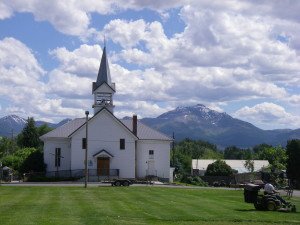 My two worlds were invited to come together. I just accepted a position with the Presbytery of the Cascades (the 97-church district that covers Western Oregon and a small slice of Southern Washington and Northern California) to become the Presbyter for Vision and Mission. To the outside world the language may sound clunky, but essentially it is the head of staff executive position in charge of seeing the church through the next few years of deepening our mission and creating a unified vision that will pull our congregations forward for the next generation or so.It is a sobering position given the general decline of our mainline Protestant denominations and the shifting patterns around religious affiliation and loyalty. But more than that, it represents the engagement of my two worlds that have often been awkward dance partners in my professional life. As I have described in the past I have often felt like I have one foot squarely planted in the life, the rhythm and the rituals of the church and the other foot planted in the secular spirituality of our communities where the Sacred can be found just as easily out on the hiking trail, waist deep in the river, or with a coffee cup and a Sunday paper in hand at an bustling outdoor café.
My two worlds were invited to come together. I just accepted a position with the Presbytery of the Cascades (the 97-church district that covers Western Oregon and a small slice of Southern Washington and Northern California) to become the Presbyter for Vision and Mission. To the outside world the language may sound clunky, but essentially it is the head of staff executive position in charge of seeing the church through the next few years of deepening our mission and creating a unified vision that will pull our congregations forward for the next generation or so.It is a sobering position given the general decline of our mainline Protestant denominations and the shifting patterns around religious affiliation and loyalty. But more than that, it represents the engagement of my two worlds that have often been awkward dance partners in my professional life. As I have described in the past I have often felt like I have one foot squarely planted in the life, the rhythm and the rituals of the church and the other foot planted in the secular spirituality of our communities where the Sacred can be found just as easily out on the hiking trail, waist deep in the river, or with a coffee cup and a Sunday paper in hand at an bustling outdoor café. For years I have either felt this need to choose one or the other or bring them together at the risk of alienating myself from both communities. It happens all the time. If I try to make room in the church for the nature-loving spiritualist who trades out the name of God for the concept of the Sacred I get puzzled looks and questions like, “I certainly respect their brand of faith, but what does that have to do with church?” And if I let slip too early that I happen to be a minister with my hiking, biking, snow-shoeing buddies I can feel the air suddenly grow cold between us as if I had a bad case of garlic breath.But this new position gives me the opportunity to bring these two worlds together. In fact that is what I am supposed to do. Last year our presbytery had a net loss of 5.8% and 850 members. Unfortunately that pattern has been going on for many years and seems to be picking up speed. I think the Presbyterian Church is finally ready to acknowledge that our future is not in doing church better but is in understanding the spiritual needs and lives of those whose closest association with church is admiring the stained glass windows while walking their dog across the street.I know that there were many reasons for my selection as the new Presbyter ("Executive" in secular terms). Among them my broad range of experiences as a minister including interim positions, new church development, legacy/closure work, and solo pastorates. I also co-moderated the East Portland Vision Plan, a 25-year plan for the quarter million people in East Portland, to improve infrastructure, the economy, parks, bike lanes, traffic patterns, community-building and political clout.
For years I have either felt this need to choose one or the other or bring them together at the risk of alienating myself from both communities. It happens all the time. If I try to make room in the church for the nature-loving spiritualist who trades out the name of God for the concept of the Sacred I get puzzled looks and questions like, “I certainly respect their brand of faith, but what does that have to do with church?” And if I let slip too early that I happen to be a minister with my hiking, biking, snow-shoeing buddies I can feel the air suddenly grow cold between us as if I had a bad case of garlic breath.But this new position gives me the opportunity to bring these two worlds together. In fact that is what I am supposed to do. Last year our presbytery had a net loss of 5.8% and 850 members. Unfortunately that pattern has been going on for many years and seems to be picking up speed. I think the Presbyterian Church is finally ready to acknowledge that our future is not in doing church better but is in understanding the spiritual needs and lives of those whose closest association with church is admiring the stained glass windows while walking their dog across the street.I know that there were many reasons for my selection as the new Presbyter ("Executive" in secular terms). Among them my broad range of experiences as a minister including interim positions, new church development, legacy/closure work, and solo pastorates. I also co-moderated the East Portland Vision Plan, a 25-year plan for the quarter million people in East Portland, to improve infrastructure, the economy, parks, bike lanes, traffic patterns, community-building and political clout.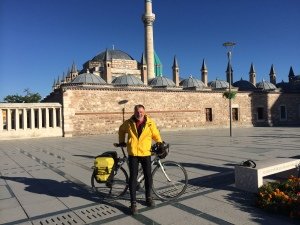 But I believe a big part of this invitation is that for years I have lived in the awkward space between two worlds, between the rich historic traditions of the church and the experimental spiritualities emerging in our communities. Quite honestly it would have been easier on my mental health and pocket book to have settled into one or the other rather than to straddle two worlds, but my love of both left me no choice but live in the space between. The sacrifices, the occasional suspicions and the months on food stamps were all worth it.I do know that this invitation to lead the Presbytery is no perfect and final panacea. It will still be a struggle to introduce these different worlds to each other and get them to find common ground and learn to trust and enjoy each other. There will still be initial suspicion and awkwardness. This is not like winning the lottery, but more like finally being accepted to race the Boston Marathon. It's not a magic pill, but the terrain has changed. What has changed is now my livelihood is based on building those bridges whereas before I risked my livelihood in my attempts to build those bridges. Now I am rewarded for the risks whereas before I often suffered for the risks. It is, at least in my heart and soul, a monumental shift.I have been writing about my experience of living in two worlds for over five years. Now it is two worlds and one job.Maybe there really is a God!
But I believe a big part of this invitation is that for years I have lived in the awkward space between two worlds, between the rich historic traditions of the church and the experimental spiritualities emerging in our communities. Quite honestly it would have been easier on my mental health and pocket book to have settled into one or the other rather than to straddle two worlds, but my love of both left me no choice but live in the space between. The sacrifices, the occasional suspicions and the months on food stamps were all worth it.I do know that this invitation to lead the Presbytery is no perfect and final panacea. It will still be a struggle to introduce these different worlds to each other and get them to find common ground and learn to trust and enjoy each other. There will still be initial suspicion and awkwardness. This is not like winning the lottery, but more like finally being accepted to race the Boston Marathon. It's not a magic pill, but the terrain has changed. What has changed is now my livelihood is based on building those bridges whereas before I risked my livelihood in my attempts to build those bridges. Now I am rewarded for the risks whereas before I often suffered for the risks. It is, at least in my heart and soul, a monumental shift.I have been writing about my experience of living in two worlds for over five years. Now it is two worlds and one job.Maybe there really is a God!
Mountains and Sanctuaries
I am counting the days now. 18 days until I fly off to Kathmandu, Nepal to join a group of crazy, enthusiastic and hopefully fit cyclists to make an attempt to reach Everest Base Camp on the Tibet side of the border. As I near the day my anticipation grows as well as a feeling of humility for what we are about to embark on.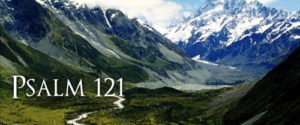 Yesterday I preached a sermon on Psalm 121 with the title "I Lift Up My Eyes to the Hills" which was the original source of this short, but ambitious pilgrimage and writing project. In my preparation I did a little research on the spiritual significance of Mt. Everest to the people who live under her watchful eye. I discovered that the Tibetan name is Chomolungma which means Goddess Mother of the World. In Nepalese the name is Sagarmatha which is translated similarly as Goddess Mother of the Sky.I suddenly gained a whole new appreciation for what we are about to embark on. I knew that I already felt a spiritual pull to climb this mountain on my bike, but the best that I could understand about my motivation was the deeply satisfying feeling of accomplishment that accompanies climbing what is within a few hundred feet of the highest "motorable road in the world." (My original plan was to cycle to Khardung La Pass which reaches another 300 feet in altitude, but that trip was cancelled. Everest Base Camp was not a bad Plan B!).But this week when I discovered that the local Tibetans and Nepalese called Mt. Everest a name that was associated with the "goddess mother" I was suddenly reminded that this is not just an athletic feat, but an invitation by another culture and by the Universe itself to cycle on sacred ground. Mt. Everest is not just a mountain, but the home of the gods and the object of religious and spiritual devotion.
Yesterday I preached a sermon on Psalm 121 with the title "I Lift Up My Eyes to the Hills" which was the original source of this short, but ambitious pilgrimage and writing project. In my preparation I did a little research on the spiritual significance of Mt. Everest to the people who live under her watchful eye. I discovered that the Tibetan name is Chomolungma which means Goddess Mother of the World. In Nepalese the name is Sagarmatha which is translated similarly as Goddess Mother of the Sky.I suddenly gained a whole new appreciation for what we are about to embark on. I knew that I already felt a spiritual pull to climb this mountain on my bike, but the best that I could understand about my motivation was the deeply satisfying feeling of accomplishment that accompanies climbing what is within a few hundred feet of the highest "motorable road in the world." (My original plan was to cycle to Khardung La Pass which reaches another 300 feet in altitude, but that trip was cancelled. Everest Base Camp was not a bad Plan B!).But this week when I discovered that the local Tibetans and Nepalese called Mt. Everest a name that was associated with the "goddess mother" I was suddenly reminded that this is not just an athletic feat, but an invitation by another culture and by the Universe itself to cycle on sacred ground. Mt. Everest is not just a mountain, but the home of the gods and the object of religious and spiritual devotion.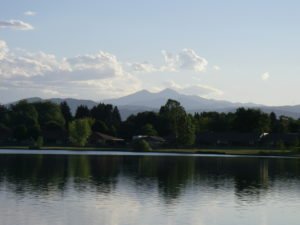 Of course, I should have known that ahead of time. I used to use Long's Peak in Colorado as the object of spontaneous meditations while growing up. Long's Peak was as temperamental as a teenager entering puberty. One day she would be calm and serene. Another day she would be threatening and frighteningly dangerous. But every day was an opportunity to meditate on the personality of the Sacred and the mysterious seasons of Life.All of this got me thinking about those things in our lives that pitch our minds, our hearts and our souls to something deeper, something more mysterious, something divinely beautiful. I am currently working my way through John O'Donohue's book Beauty: Rediscovering the True Sources of Compassion, Serenity, and Hope. He has it broken down into very convenient two to four paragraph sections that make it ideal for my morning meditations.
Of course, I should have known that ahead of time. I used to use Long's Peak in Colorado as the object of spontaneous meditations while growing up. Long's Peak was as temperamental as a teenager entering puberty. One day she would be calm and serene. Another day she would be threatening and frighteningly dangerous. But every day was an opportunity to meditate on the personality of the Sacred and the mysterious seasons of Life.All of this got me thinking about those things in our lives that pitch our minds, our hearts and our souls to something deeper, something more mysterious, something divinely beautiful. I am currently working my way through John O'Donohue's book Beauty: Rediscovering the True Sources of Compassion, Serenity, and Hope. He has it broken down into very convenient two to four paragraph sections that make it ideal for my morning meditations.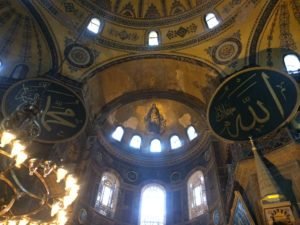 This week he reminded me of the place that houses of worship have played in people's lives for millenia. He wrote of these places as being "sanctuaries of absolute presence". But he grieves that modern people walk and drive by these sanctuaries every day completely unaware of their "divine welcome." He reminded me that at one time communities would raise money for years on end in order to erect a sanctuary in their town. It took years because a real sanctuary wasn't just four walls with movable folding chairs and an all-purpose room that could function as worship space, fellowship hall, gym, and yoga studio. A real sanctuary took thought and intention to create a worshipful atmosphere that pitched the mind, the heart and the soul to that mysterious presence we often call God or the Sacred. High arched ceilings, stained glass windows, and entryways that caused even the most skeptical to feel that they were standing on holy ground as they entered.I realized as I read O'Donohue's reminder of the role that sanctuaries played in our communities at the same time that I was preparing to climb the bottom half of Mt. Everest that I experience a similar invitation in both--that is, the invitation to pitch my mind, my heart and my soul to the deeper mystery of Life.Mountains are sanctuary for me. I can't stare at a magnificently carved mountain without feeling that God Herself (remember Mt. Everest is the Goddess Mother!) is inviting me to dance with her. I can't climb over the ridges and passes without feeling like the mountain is my lover. And I have the same experience in a worship space that is intricately and intentionally designed to draw out my soulful impulses. When the light is just right, the preaching is poetic, the music is heartfelt and the silences are loud that same feeling of awe and intimacy that I feel on with the mountain permeates my soul.
This week he reminded me of the place that houses of worship have played in people's lives for millenia. He wrote of these places as being "sanctuaries of absolute presence". But he grieves that modern people walk and drive by these sanctuaries every day completely unaware of their "divine welcome." He reminded me that at one time communities would raise money for years on end in order to erect a sanctuary in their town. It took years because a real sanctuary wasn't just four walls with movable folding chairs and an all-purpose room that could function as worship space, fellowship hall, gym, and yoga studio. A real sanctuary took thought and intention to create a worshipful atmosphere that pitched the mind, the heart and the soul to that mysterious presence we often call God or the Sacred. High arched ceilings, stained glass windows, and entryways that caused even the most skeptical to feel that they were standing on holy ground as they entered.I realized as I read O'Donohue's reminder of the role that sanctuaries played in our communities at the same time that I was preparing to climb the bottom half of Mt. Everest that I experience a similar invitation in both--that is, the invitation to pitch my mind, my heart and my soul to the deeper mystery of Life.Mountains are sanctuary for me. I can't stare at a magnificently carved mountain without feeling that God Herself (remember Mt. Everest is the Goddess Mother!) is inviting me to dance with her. I can't climb over the ridges and passes without feeling like the mountain is my lover. And I have the same experience in a worship space that is intricately and intentionally designed to draw out my soulful impulses. When the light is just right, the preaching is poetic, the music is heartfelt and the silences are loud that same feeling of awe and intimacy that I feel on with the mountain permeates my soul. I write this as a reminder to myself and others that spiritual worship is not just the domain of the church and any old worship space. Nor is spiritual worship just the domain of the nature purist who is as religious about their Sunday hikes and kayaking adventures as the Sunday faithful who sit in the pews. I think spiritual worship is anything that has the ability to pitch our minds, our hearts and our souls to something deeper, something more mysterious, something divinely beautiful.In eighteen days I will leave for the Goddess Mother of the World--Mt. Everest. I will miss four Sundays of preaching. But I don't think I'll miss a single day of worship. I'll be worshiping with each pedal stroke.I have a good life.
I write this as a reminder to myself and others that spiritual worship is not just the domain of the church and any old worship space. Nor is spiritual worship just the domain of the nature purist who is as religious about their Sunday hikes and kayaking adventures as the Sunday faithful who sit in the pews. I think spiritual worship is anything that has the ability to pitch our minds, our hearts and our souls to something deeper, something more mysterious, something divinely beautiful.In eighteen days I will leave for the Goddess Mother of the World--Mt. Everest. I will miss four Sundays of preaching. But I don't think I'll miss a single day of worship. I'll be worshiping with each pedal stroke.I have a good life.
Rev. Dr. Jeffress? Are You Listening?
There are times when silence is taking a position of neutrality. And then there are times when silence speaks as loud and clear as any voice coming through a megaphone. This is one of those times. Silence is dangerous.The great theologian, pastor and German patriot, Dietrich Bonhoeffer, who was hung for his assassination attempt on Hitler wrote,
Silence in the face of evil is itself evil; God will not hold us guiltless. Not to speak is to speak. Not to act is to act."
This is my time. I can no longer be silent. The events in Charlottesville have me all stirred up, but this post was already writing itself earlier this week as a "new Cuban missile crisis" was unfolding between Trump and North Korea. I wonder if a Charlottesville post may find its way out of my consciousness too later in the week.This post, however, is intended to challenge the Rev. Dr. Robert Jeffress, one of Trump's spiritual advisors, for his Biblical endorsement that God has placed Trump in a position where killing North Korea's leader, Kim Jong Un, is not only okay but expected. Don't get me wrong. Kim Jong Un scares the bejeebies out of me. The way this 33-year old male flexes his international muscles and displays his flaccid masculinity through the threat of nuclear weapons and war makes me very nervous.There are definitely reasons that our own government should be monitoring (at the very least) or addressing how to neutralize this person and his rogue nation. In fact, if, after careful analysis, sanctions, attempts at diplomacy, etc., etc., etc., that a determination was made to take him out I might even be tempted to support such an extreme measure (despite my immediate revulsion at resorting to such primitive actions).Where I draw the line is hearing a pastor who holds sway with not only a 13,000-member church, tens of millions of Americans as a Fox contributor, and the President's ear as an advisor that GOD HIMSELF has pre-ordained Trump, by virtue of his office, to use any means necessary to eradicate evil from this world--especially if it looks like an overweight 5' 7" eternally boyish-like man named Kim Jong Un.This is really dangerous territory. There may be political reasons that Kim Jong Un may need to be neutralized at some point. But to claim that you know the mind of God so well or that you understand the Bible so perfectly as to give the thumbs up to your president to orchestrate an assassination is completely absurd and an absolute abuse of a pastor's moral authority.You see, "Rev." Jeffress, you aren't the only one who relies on such divine permission when it comes to killing in God's name. You might recall that radical Islamic terrorism is also based on the premise that God wills the punishment and the death of people referred to as infidels. You might recall that Hitler felt justified in his genocidal plan against Jews for their "rejection of Jesus Christ, the Son of God." You might recall that Jim Jones, the founder of the People's Church, was so convinced that he was doing God's work that he brainwashed and ordered the deaths of hundreds of followers who "drank the Kool-Aid."It's amazing how much God gets around, isn't it Dr. Jeffress?! And it's dizzying how little consistency God seems to have with regard to who is truly evil and who is truly good. It makes me very nervous that you seem to know inner workings of God's mind when so many have gotten it wrong before. Are you that arrogant or naive, seriously?Dr. Jeffress, I am a Christian pastor of a church filled with both Democrats and Republicans. I have to be very careful when I am preaching and praying that I don't say anything that appears to endorse one party or one candidate over another. I have no problem preaching the Christian gospel and letting the chips fall where they may after that, but I won't ever come out in favor of one party or candidate from the pulpit (I reserve that for my blog!).But you, Dr. Jeffress, are fair game. Despite your role as a spiritual advisor to President Trump you are also a Christian minister. And as a Christian minister anytime you speak you also represent me and my profession. And I have no problem telling you, Dr. Jeffress, that you are completely out of line and that your selective quoting of the Bible in order to sanction our president's whims is an abomination to our profession.You are aware, of course, Dr. Jeffress, as a Biblical scholar that Deuteronomy 21: 18-21 also commands that children who continue to be rebellious should be stoned to death by the "men of the village" in order to eradicate evil from their midst. But I would guess that you are sane enough not to sanction the killing of our own children for simple rebelliousness despite the fact that the Bible is as clear about that as it is about giving kings the divine right to eradicate evil by any means necessary. How can you be so smugly self-assured about one Biblical text and so dismissive of another one? Or do you read one Bible for foreigners and another Bible for your friends and family?Dr. Jeffress, I am no fan of this man you serve as a spiritual advisor. I have been harsh and outspoken on his absent moral character, his lack of integrity, and his inability to understand the role of the President. I am a citizen of these United States and I expect something more from my President. But I am also a pastor like you. I am in the same profession as are you. I hold the same title of Christian minister like you.But I have come to the conclusion that you are me are not alike. You think you know God's mind well enough to tell the adolescent-minded and impulsive Trump that God gives him the right to neutralize Kim Jong Un.I read the same Bible as you and I don't think God wants anyone annihilated. You are a lot more sure about what God wants than I am.But I am 100% sure that God wants one thing--that you quit being God's overconfident agent of U.S. nationalism and supremacy.Trump doesn't need more reasons to flex his muscles and coax other insecure men into an international nuclear cock fight.And, quite honestly, I don't need people like you making the Christian ministry look bad. This work is hard enough without you telling people who God wants dead and who should kill them.Shoot, Dr. Jeffress, despite my disdain for you, I don't even want to see you dead. I just want you to shut that poisonous pie hole of yours.
Everest or Bust!
I have always been a mountain person. I was born in Montana, raised at the foot of the Rockies in Colorado and went to college in Idaho, just a short drive from Bogus Basin ski area. When our young family moved to Wisconsin for my first call in a church we realized that we didn’t fit very well. We chalked up it up to different social norms and cultural expectations. But looking back at it I wonder how much of it was the absence of mountains.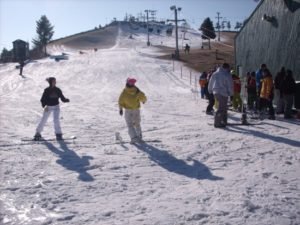 I remember when we were driving up to Milwaukee for some shopping and ahead of me I saw a sign that alerted us to an upcoming ski area. Cross country skiing is a big sport back there, but this sign had stick figure skiers pointed down in the middle of a couple of squiggly lines that were meant to signify a mountain.My jaw dropped.The highest thing I had seen in Wisconsin was an antenna on a fifth story apartment building. But the sign kept its promise and a mile later another sign with the same picture greeted us but this time with an arrow pointing to the left. I quickly went from a gaping open mouth to an exaggerated shaking of my head while zinging out in rapid fire succession, “No! No! No! No!”Right next to the sign that pointed us to the winter playground was another sign pointing the same direction that said, “County landfill.” These Wisconsinites had covered an old landfill with dirt, had installed a rope tow up to the top of the mound of trash and when the snow had covered enough of the pile with the fluffy white stuff they called it a ski area. Stunning!I grew up skiing at Arapahoe Basin in Colorado that takes one up above timberline to nearly 11,000 feet and in Vail with their overpriced lift tickets and celebrity residents. Those were ski areas! I suppose that this mound of dirt in Wisconsin was technically a ski area, but getting the words to fall out of my mouth was nothing less than painful.
I remember when we were driving up to Milwaukee for some shopping and ahead of me I saw a sign that alerted us to an upcoming ski area. Cross country skiing is a big sport back there, but this sign had stick figure skiers pointed down in the middle of a couple of squiggly lines that were meant to signify a mountain.My jaw dropped.The highest thing I had seen in Wisconsin was an antenna on a fifth story apartment building. But the sign kept its promise and a mile later another sign with the same picture greeted us but this time with an arrow pointing to the left. I quickly went from a gaping open mouth to an exaggerated shaking of my head while zinging out in rapid fire succession, “No! No! No! No!”Right next to the sign that pointed us to the winter playground was another sign pointing the same direction that said, “County landfill.” These Wisconsinites had covered an old landfill with dirt, had installed a rope tow up to the top of the mound of trash and when the snow had covered enough of the pile with the fluffy white stuff they called it a ski area. Stunning!I grew up skiing at Arapahoe Basin in Colorado that takes one up above timberline to nearly 11,000 feet and in Vail with their overpriced lift tickets and celebrity residents. Those were ski areas! I suppose that this mound of dirt in Wisconsin was technically a ski area, but getting the words to fall out of my mouth was nothing less than painful.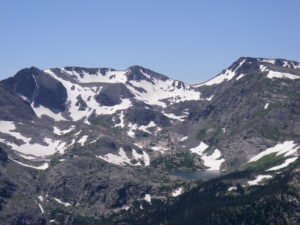 Like I said, I have always been a mountain person. But I don’t think I really knew that until one September day in 2011. I was seven weeks into my 4,000-mile cycling pilgrimage through the West. I had already crossed three major mountain ranges including the Cascades in Oregon and the Rockies twice, once in Montana and once in Colorado. I was nearing the foot of the Sierras after having spent more than one full week crossing the Nevada desert and nearly crushing me psychologically. I had rested for two days in Gardnerville, Nevada before tackling the final mountain range before cycling to the Pacific coast on my way back to Portland.The first few miles paralleled the base of the Sierras as I pedaled along farms with a few cattle, horses, sheep and goats. Eventually the road veered to the right and I was greeted with an increasingly steep road that was snaking its way through a pine-covered forest and alongside a rushing snow-fed stream.I had only pedaled a few strokes when I suddenly exhaled out loud, “I am home. I am home.” My body relaxed. My breathing settled in and I began cranking hard to power my way over the 8,573 foot Kit Carson pass that would point to the Central Valley of California. It was an odd moment. I was at the foot of a major mountain pass where I knew I was going to have to dig deep yet I relaxed as the road began to snake its way up into the stratosphere.
Like I said, I have always been a mountain person. But I don’t think I really knew that until one September day in 2011. I was seven weeks into my 4,000-mile cycling pilgrimage through the West. I had already crossed three major mountain ranges including the Cascades in Oregon and the Rockies twice, once in Montana and once in Colorado. I was nearing the foot of the Sierras after having spent more than one full week crossing the Nevada desert and nearly crushing me psychologically. I had rested for two days in Gardnerville, Nevada before tackling the final mountain range before cycling to the Pacific coast on my way back to Portland.The first few miles paralleled the base of the Sierras as I pedaled along farms with a few cattle, horses, sheep and goats. Eventually the road veered to the right and I was greeted with an increasingly steep road that was snaking its way through a pine-covered forest and alongside a rushing snow-fed stream.I had only pedaled a few strokes when I suddenly exhaled out loud, “I am home. I am home.” My body relaxed. My breathing settled in and I began cranking hard to power my way over the 8,573 foot Kit Carson pass that would point to the Central Valley of California. It was an odd moment. I was at the foot of a major mountain pass where I knew I was going to have to dig deep yet I relaxed as the road began to snake its way up into the stratosphere.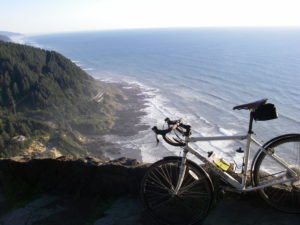 I know now that the mountains and my body and soul belong together. I really confirmed that during my two-year stint in the bucolic little village of Yachats on the Oregon coast. The truth is I had it really good there. Yachats sometimes shows up on the "Top Ten Best Places to Visit in the World" lists. It truly is a magical place. During my second year there I arranged to house sit for a family in exchange for watching over their property while it was for sale. This was a large modern house with picture windows that covered the entire span of the ocean-facing walls. The house was probably forty vertical feet above the ocean and every night I went to sleep with the sound of the waves rhythmically caressing me and the moist ocean air blowing through my window and across my face. And I was enjoying this rent free!Like I said, I had it really good! But given the option between an ocean front home and a cabin in the woods I would choose the latter every time. The ocean was magical. But I know I belong in the mountains.So to the mountains I go again!In September I will leave on another one of my magical adventures--this time to Nepal and Tibet where I and handful of other crazy cyclists will make an ascent in the Himalayas to a spot near Everest Base Camp. Four years ago I made a list of all the possible pilgrimages I might want to tackle. I ended up choosing the route to Rumi's Tomb in Konya, but the Everest Base Camp ascent was high on my list. I vowed it would be near the top next time the itch to travel overwhelmed me.
I know now that the mountains and my body and soul belong together. I really confirmed that during my two-year stint in the bucolic little village of Yachats on the Oregon coast. The truth is I had it really good there. Yachats sometimes shows up on the "Top Ten Best Places to Visit in the World" lists. It truly is a magical place. During my second year there I arranged to house sit for a family in exchange for watching over their property while it was for sale. This was a large modern house with picture windows that covered the entire span of the ocean-facing walls. The house was probably forty vertical feet above the ocean and every night I went to sleep with the sound of the waves rhythmically caressing me and the moist ocean air blowing through my window and across my face. And I was enjoying this rent free!Like I said, I had it really good! But given the option between an ocean front home and a cabin in the woods I would choose the latter every time. The ocean was magical. But I know I belong in the mountains.So to the mountains I go again!In September I will leave on another one of my magical adventures--this time to Nepal and Tibet where I and handful of other crazy cyclists will make an ascent in the Himalayas to a spot near Everest Base Camp. Four years ago I made a list of all the possible pilgrimages I might want to tackle. I ended up choosing the route to Rumi's Tomb in Konya, but the Everest Base Camp ascent was high on my list. I vowed it would be near the top next time the itch to travel overwhelmed me. But there is more to this.I have been a student of religious literature for nearly four decades now. One of the things that shows up consistently is that many of the epiphanies and revelations of religious literature happen on mountains. Moses is given the Ten Commandments on Mt. Sinai. Jesus is transfigured before the disciples' eyes on a mountain. Jesus even preaches a "sermon on the mount" as if his teachings were more likely to take root in the thin air of a mountain than in the bustling commotion of a marketplace.I know that my very first "mystical" experience--where I suddenly got lost in the scenery and couldn't find the line between the observer and the observed--happened on the top of a mountain after cranking my way up it on two wheels. Still to this day the mountains touch me in a place that no other landscape can. When I am in the mountains my lungs expand, my breathing deepens, and my soul exclaims, "You're home, Brian. You're home."As I have done in the past I will invite you into this journey. I am currently pouring over both sacred and secular literature where mountains play a significant and often transformative role. While in Nepal and Tibet I will be living with those texts in my mind and my heart while my legs carry me up the mountains. I will blog as often as Wifi is available in that remote place.Next blog will be a reflection on John Denver's song, Rocky Mountain High. "He was born in the summer of his 27th year..."See you at the top!
But there is more to this.I have been a student of religious literature for nearly four decades now. One of the things that shows up consistently is that many of the epiphanies and revelations of religious literature happen on mountains. Moses is given the Ten Commandments on Mt. Sinai. Jesus is transfigured before the disciples' eyes on a mountain. Jesus even preaches a "sermon on the mount" as if his teachings were more likely to take root in the thin air of a mountain than in the bustling commotion of a marketplace.I know that my very first "mystical" experience--where I suddenly got lost in the scenery and couldn't find the line between the observer and the observed--happened on the top of a mountain after cranking my way up it on two wheels. Still to this day the mountains touch me in a place that no other landscape can. When I am in the mountains my lungs expand, my breathing deepens, and my soul exclaims, "You're home, Brian. You're home."As I have done in the past I will invite you into this journey. I am currently pouring over both sacred and secular literature where mountains play a significant and often transformative role. While in Nepal and Tibet I will be living with those texts in my mind and my heart while my legs carry me up the mountains. I will blog as often as Wifi is available in that remote place.Next blog will be a reflection on John Denver's song, Rocky Mountain High. "He was born in the summer of his 27th year..."See you at the top!
The Culture of Curiosity
Angst. Wrestling. Struggle.For those of you who have read my blog for awhile you will recognize a certain thread of angst that shows up from time to time, usually in waves. If I felt that this was particular only to me I would make sure that my angst was worked out on the therapist's couch and leave you out of my personal dramas. But I am quite convinced that my struggle to find my place in this shifting religious/spiritual realm is not confined to me, but is just a symptom of the deeper and larger issues our religious institutions are facing.It may be just a little more pronounced in me because my livelihood is tied to this. The average parishioner who is lamenting, "I hope my church doesn't go away" is just the tamer version of my lament, "Might my livelihood be in jeopardy?" Almost never are my blogs just playful intellectual exercises. They are efforts to negotiate our way into this emerging new world and to work through where I fit, if I fit and whether there will be any paychecks associated with it when "it" comes. A few days ago I had a breakthrough.Somewhere in the midst of my last two blogs on the deeper meaning of my vertigo attacks and the comments to my blog something broke loose. I think I found the source of this angst, this wrestling and this struggle that keeps surfacing in my writing and my life.I am calling this blog "The Culture of Curiosity." I think it was a combination of two comments, one from Roy and one from Herman, that broke this open for me. Their comments seemed to jar me into finding the source of all this. And I suddenly found myself going all the way back to my days in college taking religion courses.You see, the thing is, I never intended to become a church pastor. In college I worked on a double major. I took a Sports and Fitness Center Management major thinking that I would likely work my way into being the executive director of a YMCA or similar health-centered community center. But I also worked my way through a religion degree simply because I loved the studies so much that I couldn't keep away from it. I took religion for the sheer joy of it and majored in Sports Management as a decent way to make a living.I know people around me saw what I couldn't, but following college I headed off to seminary for a master's in religion. Still, I had no intention of becoming a pastor; I just couldn't curb this deep curiosity I had for religious studies. (I know you are thinking, "He's getting a master's in religion and doesn't want to be a pastor? This dude is a little slow!")
A few days ago I had a breakthrough.Somewhere in the midst of my last two blogs on the deeper meaning of my vertigo attacks and the comments to my blog something broke loose. I think I found the source of this angst, this wrestling and this struggle that keeps surfacing in my writing and my life.I am calling this blog "The Culture of Curiosity." I think it was a combination of two comments, one from Roy and one from Herman, that broke this open for me. Their comments seemed to jar me into finding the source of all this. And I suddenly found myself going all the way back to my days in college taking religion courses.You see, the thing is, I never intended to become a church pastor. In college I worked on a double major. I took a Sports and Fitness Center Management major thinking that I would likely work my way into being the executive director of a YMCA or similar health-centered community center. But I also worked my way through a religion degree simply because I loved the studies so much that I couldn't keep away from it. I took religion for the sheer joy of it and majored in Sports Management as a decent way to make a living.I know people around me saw what I couldn't, but following college I headed off to seminary for a master's in religion. Still, I had no intention of becoming a pastor; I just couldn't curb this deep curiosity I had for religious studies. (I know you are thinking, "He's getting a master's in religion and doesn't want to be a pastor? This dude is a little slow!") It wasn't until I was only fourteen months from graduating that an internship in a church convinced me that being a pastor was the right place for me. Where else could I satisfy this insatiable desire to study religion, dive into the realm of the sacred, and the ponder the role that humans should play in the cosmos.In seminary I took advantage of theology courses with every elective I had. I studied the writings and speeches of Rev. Dr. Martin Luther King, Jr. and Malcolm X. I dove into the theology that emerged from the Holocaust, studying both Jewish literature and Christian literature. I wrote a paper in my Reformed theology class on the "Death of God" theology that emerged in the 60's. And I studied Latin American Liberation Theology that was at the root of confronting political corruption in Central America in the 1980's. In other words, I had all kinds of fun satisfying my theological curiosity.
It wasn't until I was only fourteen months from graduating that an internship in a church convinced me that being a pastor was the right place for me. Where else could I satisfy this insatiable desire to study religion, dive into the realm of the sacred, and the ponder the role that humans should play in the cosmos.In seminary I took advantage of theology courses with every elective I had. I studied the writings and speeches of Rev. Dr. Martin Luther King, Jr. and Malcolm X. I dove into the theology that emerged from the Holocaust, studying both Jewish literature and Christian literature. I wrote a paper in my Reformed theology class on the "Death of God" theology that emerged in the 60's. And I studied Latin American Liberation Theology that was at the root of confronting political corruption in Central America in the 1980's. In other words, I had all kinds of fun satisfying my theological curiosity.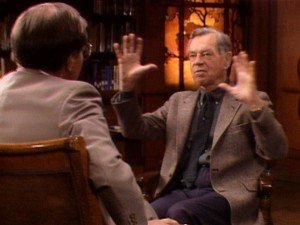 When I graduated personal friends who were just a couple of years ahead of me in seminary gave me a copy of Bill Moyer's Power of Myth, the transcript of his interviews with the famed anthropologist and professor, Joseph Campbell. These friends were my contemporaries and like me they lived in a "culture of curiosity", a culture that many of my Baby Boomer friends also resonated with.I was on a roll. I had bachelor's in religion with honors for my work on "The Protestant Response to the Holocaust." I had a master's degree in religion with an emphasis on theology. I was stretching myself into understanding our Christian tradition through the lens of religious mythology. I was becoming a bit of a theologian in my own right. I was completely in my element.And then something happened. I became a pastor and my culture of curiosity clashed with the culture of church. What had served me so well in college and seminary suddenly unnerved many in my congregations. I remember so very clearly the conversation with a pastor twenty years my senior who cornered me one day with a wrinkled smile on her face saying, "I hear you caused quite a ruckus over at your church this Easter."I said, "Yeah. And the weird thing about it is all I did was preach the stuff we learned in seminary."I will never forget what she said next, "Oh Brian, I know. But you don't bring that stuff into the church."That was the day my world changed and the day that probably serves as the origin of my angst, my wrestling and my struggle. I got into this whole religion business because I found that there was nothing as satisfying as reading, discussing, thinking about, and pondering theology and spirituality. I got into this business because I wanted to be part of an institution charged with asking the big questions of life such as, "Why am I here?" "What is my ultimate purpose in life?" "How ought we to be treating each other?" "What is the nature of life itself?"
When I graduated personal friends who were just a couple of years ahead of me in seminary gave me a copy of Bill Moyer's Power of Myth, the transcript of his interviews with the famed anthropologist and professor, Joseph Campbell. These friends were my contemporaries and like me they lived in a "culture of curiosity", a culture that many of my Baby Boomer friends also resonated with.I was on a roll. I had bachelor's in religion with honors for my work on "The Protestant Response to the Holocaust." I had a master's degree in religion with an emphasis on theology. I was stretching myself into understanding our Christian tradition through the lens of religious mythology. I was becoming a bit of a theologian in my own right. I was completely in my element.And then something happened. I became a pastor and my culture of curiosity clashed with the culture of church. What had served me so well in college and seminary suddenly unnerved many in my congregations. I remember so very clearly the conversation with a pastor twenty years my senior who cornered me one day with a wrinkled smile on her face saying, "I hear you caused quite a ruckus over at your church this Easter."I said, "Yeah. And the weird thing about it is all I did was preach the stuff we learned in seminary."I will never forget what she said next, "Oh Brian, I know. But you don't bring that stuff into the church."That was the day my world changed and the day that probably serves as the origin of my angst, my wrestling and my struggle. I got into this whole religion business because I found that there was nothing as satisfying as reading, discussing, thinking about, and pondering theology and spirituality. I got into this business because I wanted to be part of an institution charged with asking the big questions of life such as, "Why am I here?" "What is my ultimate purpose in life?" "How ought we to be treating each other?" "What is the nature of life itself?"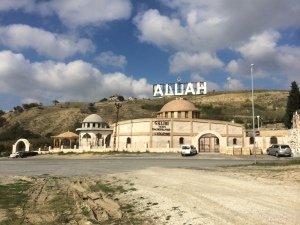 But the deeper I explored those questions the more I felt I was skating on thin ice in the church. I could feel a subtle and not-so-subtle pressure to spend more time reinforcing people's already chosen beliefs rather than venturing into new worlds. My curiosity has led me to Bali where I was able to experience a Hindu "baptism" and rituals of absolving. I powered my way by pedal and two wheels into Muslim Turkey where I shared with brothers and sisters the spiritual discipline of five times a day prayer. In two months I will fly to Nepal and cycle to Everest Base Camp all the while visiting Buddhist temples and monasteries and getting a taste of Buddhist daily life.I have two degrees in religion not because I wanted to be well-prepared to serve as a pastor. No, I have these degrees because I am deeply curious about the religious questions that simmer in the hearts and souls of every human being.This is what makes my heart sing. This is what drove me to spend tens of thousands of dollars on degrees with nary a plan for how I might use it professionally. This curiosity for the religious and soulful impulse of people and cultures is what drives me despite the puzzled I looks I sometimes get from church folks who seem to wonder, "Isn't Jesus enough for you?"My angst is this. By virtue of my age I am part of a culture of curiosity. My Baby Boomer contemporaries aren't just satisfied with the answers that the church gave them as children. They want to know how those answers stack up against the questions of our time that include pondering the truth behind Islam, Buddhism, Hinduism, Judaism, Native American spirituality and a host of other smaller religions and spiritual orientations. They want to know how our tradition is going to face the growing environmental crises that we have brought on ourselves. They want to know if and how our theology confirms the truth of science and whether the two can co-exist in the world in ways that are not mutually exclusive. They want to know if religion can become a force for unity rather than the reason for ongoing division.At their core, they want to know if their theological curiosity will be welcome or a threat.On that issue the jury is still out.
But the deeper I explored those questions the more I felt I was skating on thin ice in the church. I could feel a subtle and not-so-subtle pressure to spend more time reinforcing people's already chosen beliefs rather than venturing into new worlds. My curiosity has led me to Bali where I was able to experience a Hindu "baptism" and rituals of absolving. I powered my way by pedal and two wheels into Muslim Turkey where I shared with brothers and sisters the spiritual discipline of five times a day prayer. In two months I will fly to Nepal and cycle to Everest Base Camp all the while visiting Buddhist temples and monasteries and getting a taste of Buddhist daily life.I have two degrees in religion not because I wanted to be well-prepared to serve as a pastor. No, I have these degrees because I am deeply curious about the religious questions that simmer in the hearts and souls of every human being.This is what makes my heart sing. This is what drove me to spend tens of thousands of dollars on degrees with nary a plan for how I might use it professionally. This curiosity for the religious and soulful impulse of people and cultures is what drives me despite the puzzled I looks I sometimes get from church folks who seem to wonder, "Isn't Jesus enough for you?"My angst is this. By virtue of my age I am part of a culture of curiosity. My Baby Boomer contemporaries aren't just satisfied with the answers that the church gave them as children. They want to know how those answers stack up against the questions of our time that include pondering the truth behind Islam, Buddhism, Hinduism, Judaism, Native American spirituality and a host of other smaller religions and spiritual orientations. They want to know how our tradition is going to face the growing environmental crises that we have brought on ourselves. They want to know if and how our theology confirms the truth of science and whether the two can co-exist in the world in ways that are not mutually exclusive. They want to know if religion can become a force for unity rather than the reason for ongoing division.At their core, they want to know if their theological curiosity will be welcome or a threat.On that issue the jury is still out.
Professional and Spiritual Vertigo--Part 2
 Are you ready for this? Just 36 hours before my scary vertigo incident two weeks ago this is what I wrote to my congregation in Grants Pass as I was sharing with them the "new normal" with regard to ministry. Here were my exact words:
Are you ready for this? Just 36 hours before my scary vertigo incident two weeks ago this is what I wrote to my congregation in Grants Pass as I was sharing with them the "new normal" with regard to ministry. Here were my exact words:
"It’s enough to make your head spin! Believe me, I know! I feel sometimes like the synapses are firing non-stop and the pistons of my thinker are threatening to go on strike. This is a dizzying time."
Wow! It was as if I was predicting my own vertigo attack without knowing it. I am still open to the possibility that it was, as the doctors diagnosed, a completely random event since they were not able to trace it to any particular physical condition such as sinus congestion, a head injury or repetitive motion. And many of you have, including blood relatives, offered great advice on what it might have been and what to do about it.But whether the diagnosis is correct or not I think this is a good opportunity to dive deeper into the "professional vertigo or spiritual vertigo" of which I spoke. It was interesting that in the responses from my readers to my last blog post I noticed a small pattern (not enough to make it verifiable!). I know some of my readers either personally or by association. And the little pattern that showed up was a recognition by those in the profession of ministry who said, "I know well the professional vertigo to which you speak." And then I also recognized another pattern by some who are involved in churches, but not as pastors, who said, "Don't give up, Brian. The church needs pastors like you."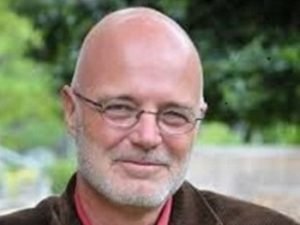 It is this dynamic to which I want to speak. The timing of this was especially interesting as just a couple of days after I published my blog piece Brian McLaren also published his blog piece on "Why Pastors and Priests are Leaving the Church--Part 2" In his piece he acknowledged that many pastors and priests feel as if their soul is dying. They entered ministry with a passion to carry out Christ's mission and ended up feeling like they have been asked to become building managers and protectors of the status quo (my slightly exaggerated paraphrase!).He went on to encourage pastors and priests to not retire early or choose another profession (as many are doing), but to commit to one of three other options that will help usher in the future of Christian community. Briefly he outlined the three as 1) start a new worshiping community, 2) becoming the catalyst for a crisis or intervention that would initiate #1, or 3) invest in the risky and hard work of transformation for those churches that still have the resources to do so.McLaren's blog post on "why pastors are leaving the church" and my vertigo attack could not be better timed. I want to say that I really appreciate McLaren's writing and his ministry. I believe that he is right on. But I also want to send a message to the folks sitting in the pews who quietly cheer people like me on in the hope that one day the church will look and feel a lot more like what they see in their heads and feel in their hearts.If my story is any indication of how costly this work is it isn't going to be enough for pastors and priests to step out on their own to facilitate the emergence of a new kind of church. Those pastors who commented on my last blog post knew well of the professional vertigo of which I speak. Many pastors today feel they have an either/or choice--livelihood or sacred calling. I think they will appreciate hearing this from me:
It is this dynamic to which I want to speak. The timing of this was especially interesting as just a couple of days after I published my blog piece Brian McLaren also published his blog piece on "Why Pastors and Priests are Leaving the Church--Part 2" In his piece he acknowledged that many pastors and priests feel as if their soul is dying. They entered ministry with a passion to carry out Christ's mission and ended up feeling like they have been asked to become building managers and protectors of the status quo (my slightly exaggerated paraphrase!).He went on to encourage pastors and priests to not retire early or choose another profession (as many are doing), but to commit to one of three other options that will help usher in the future of Christian community. Briefly he outlined the three as 1) start a new worshiping community, 2) becoming the catalyst for a crisis or intervention that would initiate #1, or 3) invest in the risky and hard work of transformation for those churches that still have the resources to do so.McLaren's blog post on "why pastors are leaving the church" and my vertigo attack could not be better timed. I want to say that I really appreciate McLaren's writing and his ministry. I believe that he is right on. But I also want to send a message to the folks sitting in the pews who quietly cheer people like me on in the hope that one day the church will look and feel a lot more like what they see in their heads and feel in their hearts.If my story is any indication of how costly this work is it isn't going to be enough for pastors and priests to step out on their own to facilitate the emergence of a new kind of church. Those pastors who commented on my last blog post knew well of the professional vertigo of which I speak. Many pastors today feel they have an either/or choice--livelihood or sacred calling. I think they will appreciate hearing this from me:
We pastors need to know that if we take the initial risks as McLaren and others encourage that there will be enough people in the pews to go with us so that we are not dangling out over a cliff for too long.
If there is a message in my sudden vertigo attack it is this: My body and soul may be crying for me to do more personal care-taking and less risk-taking. I have been at this for two full decades. The first time I initiated an emerging model in a church (option #1 in McLaren's scheme) I eventually was forced to resign when that emerging group grew too fast and too large and became a threat to the church. Later, in an artsy, philosophical coastal town I wrote a letter to the editor where I teasingly threw out that I thought of myself as an "agnostic Christian mystic biker-guy" in order to get the church and community talking about faith and spirituality. It worked. The community loved it. Church leaders contemplated firing me! More recently, I ended up on food stamps as I didn't time well the gap between two interim positions. This time I have purchased a camper just in case there is no work after my present call.All of this is to say, "I agree with Brian McLaren and some of my readers that the church needs pastors like me who are willing to take the risks to usher in this new church that is somewhere over the distant horizon yet close to our hearts." But you need to know that the costs are high. I have paid a price financially, emotionally, and professionally. Maybe the vertigo was completely coincidental. Or maybe it was my body and my soul's way of saying,
"You can't keep this up, Brian. You're almost 60, for Christ's sake!"
It is at least coincidental, if not ironic, that I wrote in my last newsletter article, "(Ministry today) is enough to make your head spin! It is dizzying!" 36 hours later I was laying on a bathroom floor unable to move in room that was spinning faster than a carnival ride.Even the three-month blog absence this spring was another sign of feeling caught between a livelihood and my calling to tease out a new future. In January I had started my job search as this present interim gradually moves toward its end. Memories of food stamps two years prior were still fresh in my mind as well as the unnerving ten months of unemployment. I wanted to blog, but I couldn't find my voice. I was afraid that too much vulnerability and honesty would keep me from getting interviews. And so I went into hiding.But somewhere between the unexpected loss of not getting the position in Colorado earlier this month and the vertigo attack just following were just the wake-up call I needed. My voice is starting to come back. These losses broke through my caution. But here is the deal. I am taking this vertigo message seriously. It is dizzying to both try to honor the needs of the present church and take the risks to tease out the future church. Every day is filled with wondering if I am playing it too safe in a church that continues to decline or taking too many risks in a church that is afraid of change. ("Play it safe and watch the church die or take risks and potentially lose my job. What a choice!") Every day I play a game where I make sure that I support the ministry status quo just enough to protect my livelihood, but not so much that I risk the rupture of my own soul and integrity.My readers are right. And Brian McLaren is right. The church and our communities desperately need pastors and priests like me who are willing to take the risks to invite the future church onto our doorstep. But I can't do it alone. I think my body and soul is telling me that now.I need and the church needs more than just quiet admiration from the sidelines. We need people who are willing to put their spiritual lives on the line for the future of the church. Until that happens pastors and priests will continue feel caught in the painful either/or of having a livelihood or following a more sacred calling.My mistake is that I have tried to have it both ways. Am I asking for too much?
But here is the deal. I am taking this vertigo message seriously. It is dizzying to both try to honor the needs of the present church and take the risks to tease out the future church. Every day is filled with wondering if I am playing it too safe in a church that continues to decline or taking too many risks in a church that is afraid of change. ("Play it safe and watch the church die or take risks and potentially lose my job. What a choice!") Every day I play a game where I make sure that I support the ministry status quo just enough to protect my livelihood, but not so much that I risk the rupture of my own soul and integrity.My readers are right. And Brian McLaren is right. The church and our communities desperately need pastors and priests like me who are willing to take the risks to invite the future church onto our doorstep. But I can't do it alone. I think my body and soul is telling me that now.I need and the church needs more than just quiet admiration from the sidelines. We need people who are willing to put their spiritual lives on the line for the future of the church. Until that happens pastors and priests will continue feel caught in the painful either/or of having a livelihood or following a more sacred calling.My mistake is that I have tried to have it both ways. Am I asking for too much?
Vertigo: Coincidence or Holy Kick in the Butt?
One of the things on which I have been able to pride myself over the years is my health. While I have sometimes struggled to keep consistent work, put roots down long enough to build relationships and establish a community the one thing I have always been able to say is, "At least I have my health." That is, until two weeks ago. I was suddenly awakened at 5:30 a.m. feeling like someone had just pushed the button to start a whirling, spinning carnival ride in my room. The room spun, sweat started oozing out of every pore of my body and a few minutes later I staggered to the bathroom to lose the contents of my evening's dinner. I expected that to be the end of violent episode imagining that I had a bad case of food poisoning. But it didn't end. After vomiting (sorry for all the yukky details) the nausea continued and I was too weak to even crawl back to my bed.I spent the next three hours trading places between the bathroom floor, my head hanging over the toilet bowl and a couple of desperate crawls back into bed. I was supposed to be leading a retreat for participants who had come as far as away as Australia and New York City to New Mexico as I helped them "Explore the Landscape of the Soul." Instead they found me in a near delirious state in my room--the vomiting and sweating taking me to the next dangerous level of dehydration (which is a serious issue at 6500 feet in the desert).I will save you all the details, but I spent the day in the Emergency Room an hour away, my two weeks of courses were promptly cancelled in order to get me home to heal. But then I suffered another attack three days later, the night before I was to fly back home. Another night in the ER and then five days of recovery at the home of new and very generous friends before having the strength to fly home again.
That is, until two weeks ago. I was suddenly awakened at 5:30 a.m. feeling like someone had just pushed the button to start a whirling, spinning carnival ride in my room. The room spun, sweat started oozing out of every pore of my body and a few minutes later I staggered to the bathroom to lose the contents of my evening's dinner. I expected that to be the end of violent episode imagining that I had a bad case of food poisoning. But it didn't end. After vomiting (sorry for all the yukky details) the nausea continued and I was too weak to even crawl back to my bed.I spent the next three hours trading places between the bathroom floor, my head hanging over the toilet bowl and a couple of desperate crawls back into bed. I was supposed to be leading a retreat for participants who had come as far as away as Australia and New York City to New Mexico as I helped them "Explore the Landscape of the Soul." Instead they found me in a near delirious state in my room--the vomiting and sweating taking me to the next dangerous level of dehydration (which is a serious issue at 6500 feet in the desert).I will save you all the details, but I spent the day in the Emergency Room an hour away, my two weeks of courses were promptly cancelled in order to get me home to heal. But then I suffered another attack three days later, the night before I was to fly back home. Another night in the ER and then five days of recovery at the home of new and very generous friends before having the strength to fly home again. I have titled this post "Vertigo: Coincidence or Holy Kick in the Butt." Both ER doctors diagnosed the same thing--I had an extreme case of vertigo. I used to think that vertigo just meant dizziness, but I have now learned that it is a whole lot more than that. It is a sudden violent attack on your equilibrium that can cause vomiting, sudden falls, and the inability to walk or even crawl. It is completely incapacitating. And the doctors have assured me that it is most likely a random attack.But I have subtitled this post "Coincidence or Holy Kick in the Butt" because I am not completely convinced that these episodes were completely random as the doctors had indicated. From a physical standpoint there was virtually nothing to point to. I had flown in from nearly sea level to 6500 feet, but just a week before I was in the Mile High City of Denver as well. I was reasonably well-hydrated as I had started drinking extra water even before my arrival. I wasn't suffering from congestion, a head injury or repetitive motions (all potential causes of vertigo). The doctors said that that is just how vertigo is--often completely random and coincidental.Yet I wonder.I wonder because I do believe the body has a way of sending messages when it needs to and "vertigo" would not be a far off description for what I had been feeling. I have written many times over the years of my feeling of "living between two worlds" which was actually the title of my 40-day Lenten devotional blog last year.
I have titled this post "Vertigo: Coincidence or Holy Kick in the Butt." Both ER doctors diagnosed the same thing--I had an extreme case of vertigo. I used to think that vertigo just meant dizziness, but I have now learned that it is a whole lot more than that. It is a sudden violent attack on your equilibrium that can cause vomiting, sudden falls, and the inability to walk or even crawl. It is completely incapacitating. And the doctors have assured me that it is most likely a random attack.But I have subtitled this post "Coincidence or Holy Kick in the Butt" because I am not completely convinced that these episodes were completely random as the doctors had indicated. From a physical standpoint there was virtually nothing to point to. I had flown in from nearly sea level to 6500 feet, but just a week before I was in the Mile High City of Denver as well. I was reasonably well-hydrated as I had started drinking extra water even before my arrival. I wasn't suffering from congestion, a head injury or repetitive motions (all potential causes of vertigo). The doctors said that that is just how vertigo is--often completely random and coincidental.Yet I wonder.I wonder because I do believe the body has a way of sending messages when it needs to and "vertigo" would not be a far off description for what I had been feeling. I have written many times over the years of my feeling of "living between two worlds" which was actually the title of my 40-day Lenten devotional blog last year.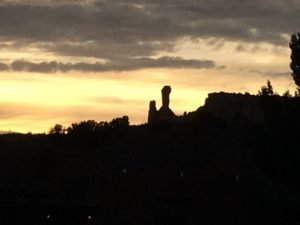 The past few weeks packed all those issues into a short time period. I spent May and the first week or so of June making sure the congregation I am serving in Grants Pass, Oregon was well-prepared for a three-week absence on my part. Then I flew off to Colorado for a 3-day job interview where my book Alone and my thoughts on the future of the church dominated much of the conversation. By the following Wednesday I heard that I was not the candidate chosen for the position. Without even a moment to let that loss sink in I then made my final preparations for the two one-week retreats in New Mexico titled, "Exploring the Landscape of the Soul" and "Health, Hope, and Hospice: Redefining Congregational Decline."The spiritual and professional vertigo is this and I have been trying to name it and negotiate my way through it for years. Within the space of just a few short weeks I played my role as a pastor of a pretty traditional Presbyterian church. A week later I was interviewing for another traditional position, but because of the public nature of my writing I found myself trying to soothe concerns that emerged in a book that exposed my spiritual wrestling (Some church members don't like their pastors wrestling too much!). Then I immediately prepared and flew off to lead "spiritual but not religious" people in the language of soul for one week to be followed by a week-long workshop for pastors serving seriously declining churches. Not only was it a crazy schedule, but it had me shifting constantly between worldviews, beliefs, and language.The spiritual and professional vertigo is this: I am constantly dancing between two different worlds depending on who I am talking to at any particular moment. Many people in the church are wary of the same spiritual wrestling that the "unchurched" find attractive in me. And those who find the sacred outside the walls of the church are often wary of my professional association with the church. In both places I have to overcome suspicions where one group is concerned that I am too religious and another group is concerned I am not religious enough.
The past few weeks packed all those issues into a short time period. I spent May and the first week or so of June making sure the congregation I am serving in Grants Pass, Oregon was well-prepared for a three-week absence on my part. Then I flew off to Colorado for a 3-day job interview where my book Alone and my thoughts on the future of the church dominated much of the conversation. By the following Wednesday I heard that I was not the candidate chosen for the position. Without even a moment to let that loss sink in I then made my final preparations for the two one-week retreats in New Mexico titled, "Exploring the Landscape of the Soul" and "Health, Hope, and Hospice: Redefining Congregational Decline."The spiritual and professional vertigo is this and I have been trying to name it and negotiate my way through it for years. Within the space of just a few short weeks I played my role as a pastor of a pretty traditional Presbyterian church. A week later I was interviewing for another traditional position, but because of the public nature of my writing I found myself trying to soothe concerns that emerged in a book that exposed my spiritual wrestling (Some church members don't like their pastors wrestling too much!). Then I immediately prepared and flew off to lead "spiritual but not religious" people in the language of soul for one week to be followed by a week-long workshop for pastors serving seriously declining churches. Not only was it a crazy schedule, but it had me shifting constantly between worldviews, beliefs, and language.The spiritual and professional vertigo is this: I am constantly dancing between two different worlds depending on who I am talking to at any particular moment. Many people in the church are wary of the same spiritual wrestling that the "unchurched" find attractive in me. And those who find the sacred outside the walls of the church are often wary of my professional association with the church. In both places I have to overcome suspicions where one group is concerned that I am too religious and another group is concerned I am not religious enough. It is something that I have wrestled with for more than twenty years, but the last few weeks exaggerated the subtle spiritual schizophrenia as I flew from place to place and state to state shifting my language, my head, my heart and my soul in order to be present to those who find God on Sunday in a sanctuary and to those who experience the sacred in the magical landscape. It is a dizzying enterprise!The doctors told me that the vertigo was completely random. In fact they wouldn't be surprised if it never showed up again. But I wonder. I wonder if my body and soul was telling me something. I wonder if my spiritual vertigo exhibited physical symptoms this time. I wonder if there was a message in those episodes, "Brian, despite your best intentions and noble motives, you can't keep dancing between two different worlds. Eventually it will crack you. Eventually you'll start to spin out of control."Maybe the vertigo was, as the doctors told me, just a one-time random, terrifying and unsettling coincidence.Or maybe it was a holy kick in the butt with a deeper message.I don't know for sure, but I sure as hell better be listening.
It is something that I have wrestled with for more than twenty years, but the last few weeks exaggerated the subtle spiritual schizophrenia as I flew from place to place and state to state shifting my language, my head, my heart and my soul in order to be present to those who find God on Sunday in a sanctuary and to those who experience the sacred in the magical landscape. It is a dizzying enterprise!The doctors told me that the vertigo was completely random. In fact they wouldn't be surprised if it never showed up again. But I wonder. I wonder if my body and soul was telling me something. I wonder if my spiritual vertigo exhibited physical symptoms this time. I wonder if there was a message in those episodes, "Brian, despite your best intentions and noble motives, you can't keep dancing between two different worlds. Eventually it will crack you. Eventually you'll start to spin out of control."Maybe the vertigo was, as the doctors told me, just a one-time random, terrifying and unsettling coincidence.Or maybe it was a holy kick in the butt with a deeper message.I don't know for sure, but I sure as hell better be listening.
Don't Let Trump Kill Integrity
"The state of being whole and undivided."
That is one of two basic definitions for the word integrity. I am kind of stickler for integrity. Partly because it was a character trait that I had to develop in my early adulthood. I am not saying that I had a habit of being two-faced about issues or that I routinely lied when it was convenient for me. No, integrity for me came in the form of bringing my emotional worlds together. Without knowing it I had a whole repressed emotional life left over from childhood. For years I kept it at bay by following a path of ambition, over-achievement, and external boosts to my ego. The path of "being whole and undivided" came for me when I could no longer hold the tiger back from his cage of repression and compartmentalization. The work of integrity came for me when I was forced to bring the fragile, scared, and hurting 3-year old into the same room as my well-endowed resume . I could go into that on another post or better yet, you could just read it about it in my book Alone: A 4,000 Mile Search for Belonging and save me the trouble!But the point of this today is just to remind us, all of us--religiously faithful, spiritually inclined, and Americans of every stripe--that integrity is important. Without integrity our world gets thrown into emotional, spiritual, and political chaos. Without integrity our souls are warped, our spirits become fractured, and our lives are left shallow and infantile.I am big on integrity. Which is why my whole body and soul literally tremble with just about every broadcast, tweet and press conference related to our new president. I need to say now that I was no fan of George W. Bush. I didn't agree with his worldview and politics. I often felt his policies were dead wrong and even destructive. And quite honestly I didn't think he had the sophisticated intellect required of the presidency. But at least he was consistently wrong for the consistent and rational reasons. At least his policies and his politics were predictable. People of integrity say one thing and do the same thing--even if it's wrong! (Of course, he failed the integrity test at times, but at this point I am willing to admit that relatively speaking, he was a person of integrity).I could make a list three pages long if I wanted to regarding President Trump's lack of integrity, but I won't. We see it every day on TV. Our Facebook pages blare the message on every other post. And I wouldn't doubt it if he is even chasing us in our dreams at night. But a couple of reminders of his blatant disregard for integrity bear repeating.
The path of "being whole and undivided" came for me when I could no longer hold the tiger back from his cage of repression and compartmentalization. The work of integrity came for me when I was forced to bring the fragile, scared, and hurting 3-year old into the same room as my well-endowed resume . I could go into that on another post or better yet, you could just read it about it in my book Alone: A 4,000 Mile Search for Belonging and save me the trouble!But the point of this today is just to remind us, all of us--religiously faithful, spiritually inclined, and Americans of every stripe--that integrity is important. Without integrity our world gets thrown into emotional, spiritual, and political chaos. Without integrity our souls are warped, our spirits become fractured, and our lives are left shallow and infantile.I am big on integrity. Which is why my whole body and soul literally tremble with just about every broadcast, tweet and press conference related to our new president. I need to say now that I was no fan of George W. Bush. I didn't agree with his worldview and politics. I often felt his policies were dead wrong and even destructive. And quite honestly I didn't think he had the sophisticated intellect required of the presidency. But at least he was consistently wrong for the consistent and rational reasons. At least his policies and his politics were predictable. People of integrity say one thing and do the same thing--even if it's wrong! (Of course, he failed the integrity test at times, but at this point I am willing to admit that relatively speaking, he was a person of integrity).I could make a list three pages long if I wanted to regarding President Trump's lack of integrity, but I won't. We see it every day on TV. Our Facebook pages blare the message on every other post. And I wouldn't doubt it if he is even chasing us in our dreams at night. But a couple of reminders of his blatant disregard for integrity bear repeating.
 Trump has consistently and ferociously attacked the New York Times as being fake news. Fine. He has a right to do that. I think he is dead wrong about this. I also think he is an ass for doing it. But he can do it. What he can't do is turn around the next week and name the New York Times as his definitive, reliable and authoritative source for his "wiretapping" accusations. Integrity is the "state of being whole and undivided."
Trump has consistently and ferociously attacked the New York Times as being fake news. Fine. He has a right to do that. I think he is dead wrong about this. I also think he is an ass for doing it. But he can do it. What he can't do is turn around the next week and name the New York Times as his definitive, reliable and authoritative source for his "wiretapping" accusations. Integrity is the "state of being whole and undivided."- During the campaign he dismissed the 4.8% unemployment numbers by the Bureau of Labor Statistics (BLS) as being "phony, totally fiction, totally made up." In fact, at different times he said that the actual numbers were probably closer to 35%, 40%, and 42%, depending on which speech you heard (he doesn't quote numbers, he feels them). But like the wave of a magic wand last week it was reported by BLS that with the ongoing recovery of the economy that the number had fallen from 4.8% to 4.7%. Guess what? The numbers were no longer phony and fictional to Trump. Now they represented Trump's savior-like effect on the economy. Had he had any integrity he would have explained how it was that he took the unemployment rate down from 40% to 4.7% in the matter of just 50 days or he would have apologized for discrediting the earlier numbers. Integrity requires a unity of truth and perception.
I know I don't need to make this obvious to all of you. Unfortunately, it is all too painfully obvious to us already. But I need to write this because we are witnessing the person who is most central to our political, economic, and cultural life putting on display a performance of a man "divided against himself."In many ways the president is the glue that holds us together. He embodies our American ideals. She holds us to our constitutional center. They act like a statesmen, and by doing so, call all Americans to a higher standard of behavior.Except that this man does not embody our American ideals. He embodies a chaotic psyche, a warped soul, a mean spirit, and a cold heart. His own internal disunity and psychic chaos risks fracturing a cultural and national integrity.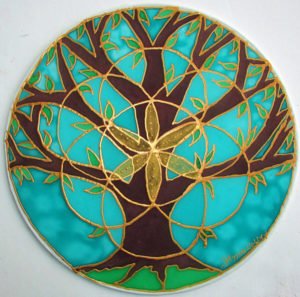 Remember integrity is the state of bringing something into wholeness and pulling that which is divided into unity. Integrity is the glue that holds a democratic people together. Without integrity the pieces start to fall apart. The whole becomes fractured. The unified becomes divided. And democracy (a system of government by the whole population) chokes and dies.Only dictators have no need for political, cultural, moral, and spiritual integrity. Only dictators can demand that we call the New York Times fake news one day and hold it up as a credible and authoritative source the next day. Only sinister people try to convince us that their warped worldviews are superior to ours. Only crazy people expect their craziness to become the norm.We can't let Trump win. He is a divided man. We can't let him divide us too.
Remember integrity is the state of bringing something into wholeness and pulling that which is divided into unity. Integrity is the glue that holds a democratic people together. Without integrity the pieces start to fall apart. The whole becomes fractured. The unified becomes divided. And democracy (a system of government by the whole population) chokes and dies.Only dictators have no need for political, cultural, moral, and spiritual integrity. Only dictators can demand that we call the New York Times fake news one day and hold it up as a credible and authoritative source the next day. Only sinister people try to convince us that their warped worldviews are superior to ours. Only crazy people expect their craziness to become the norm.We can't let Trump win. He is a divided man. We can't let him divide us too.
The longing that never goes away...
It was like looking into a mirror that had no smudges and no water spots--a perfect reflection staring back at me. I am almost finished with John O' Donohue's book Eternal Echoes: Exploring Our Yearning to Belong, the book that I have used for my morning meditations for the past few months. Last week I sat down in my man chair with a cup of strong French-press coffee and opened to the short meditation titled, The Artist as Permanent Pilgrim. My eyes grew wider with each sentence. My jaw dropped. This was a personal letter to me. After years of trying to explain how I felt caught between two worlds O' Donohue finally put words to the experience.Here is a short excerpt that was especially powerful and right on:
I am almost finished with John O' Donohue's book Eternal Echoes: Exploring Our Yearning to Belong, the book that I have used for my morning meditations for the past few months. Last week I sat down in my man chair with a cup of strong French-press coffee and opened to the short meditation titled, The Artist as Permanent Pilgrim. My eyes grew wider with each sentence. My jaw dropped. This was a personal letter to me. After years of trying to explain how I felt caught between two worlds O' Donohue finally put words to the experience.Here is a short excerpt that was especially powerful and right on:
"Every artist works from the huge belonging to the tradition, but yet does not repeat anything. The artist belongs in a strange way. He inhabits the tradition to such depth that he can feel it beat in his heart, but his tradition also makes him feel like a total stranger who can find for his longing no echo there. Out of the flow of this intimate foreignness something new begins to emerge."
Wow, John, you really nailed how I have been feeling. This nagging longing and homelessness make sense now. I have spoken often of feeling caught between two worlds and described at times a sort of love/hate relationship with my Christian tradition. Good people in my tradition wonder why I keep searching outside the lines of our tradition. And good friends who don't share my religious tradition wonder what keeps me coming back to it over and over again. O' Donohue nails it when he says that the artist can feel the depth of the tradition beat in his heart and feel like a total stranger to the tradition at the same time.Yes! Yes! Yes! That's it! I wonder if this is how Jesus felt when he said, "I came not to abolish the law and the prophets, but to fulfill them." I wonder if he too was deeply in love with his Jewish tradition and identity and yet, at the same time, felt completely misunderstood and foreign to it also. I wonder if his longing for God represented both the deepest and best part of his tradition and represented how shallow his tradition could often be. I wonder if he felt like a Jewish son and an unknown stranger all at the same time.O' Donohue says that the artist becomes a permanent pilgrim because the longing never goes away until the work is complete. He writes,
I wonder if this is how Jesus felt when he said, "I came not to abolish the law and the prophets, but to fulfill them." I wonder if he too was deeply in love with his Jewish tradition and identity and yet, at the same time, felt completely misunderstood and foreign to it also. I wonder if his longing for God represented both the deepest and best part of his tradition and represented how shallow his tradition could often be. I wonder if he felt like a Jewish son and an unknown stranger all at the same time.O' Donohue says that the artist becomes a permanent pilgrim because the longing never goes away until the work is complete. He writes,
"Each (artist) is haunted by some inner voice that will not permit any contentment until what is demanded is created. The artist cannot settle into the consensus of normal belonging."
Damn! This guy really knows me. And any of you who have gotten to know me over the years probably recognize this as well. "What drives this guy?" "Will he ever settle down?" "I wish he would just learn to be content with something?" "Is nothing ever good enough for him?"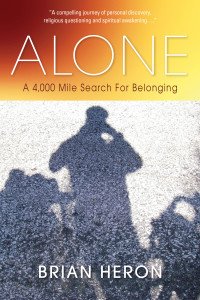 I am so thankful for O' Donohue's words. While I may never feel normal, his words normalized my experience. It makes sense why I continue to dive into the depths of my Christian tradition and feel unbelievably frustrated and disappointed in it at the same time. It makes sense that no matter how many times I go on pilgrimage and stretch a congregation a little more it is never enough. My title Alone: A 4,000 Mile Search for Belonging makes complete sense. Like an artist I have a vision in my head and a longing in my heart and there will be no sigh of relief until the final brushstroke is applied, the last chip of wood is carved out and the final coat of varnish is applied. This piece of art is a lifetime in the making.O' Donohue writes, "The artist is always faithful to longing, first."Truth be told this is my god. Even though I serve the church it is not the church that owns my soul. And even though I am fiercely, annoyingly independent it is not my ego that drives me. Rather it is this longing to hear the echo of an eternal presence and to feel an intimate belonging that transcends this world's definitions. It is to listen for the sacred heartbeat of God and know that my heart too beats in rhythm.O' Donohue said it. The artist is one who lives the longing, worships the longing and follows the longing until the longing is satisfied by the sweet taste of eternity and the enjoyment of divine intimacy. This type of artist is a permanent pilgrim.Will you travel with me?
I am so thankful for O' Donohue's words. While I may never feel normal, his words normalized my experience. It makes sense why I continue to dive into the depths of my Christian tradition and feel unbelievably frustrated and disappointed in it at the same time. It makes sense that no matter how many times I go on pilgrimage and stretch a congregation a little more it is never enough. My title Alone: A 4,000 Mile Search for Belonging makes complete sense. Like an artist I have a vision in my head and a longing in my heart and there will be no sigh of relief until the final brushstroke is applied, the last chip of wood is carved out and the final coat of varnish is applied. This piece of art is a lifetime in the making.O' Donohue writes, "The artist is always faithful to longing, first."Truth be told this is my god. Even though I serve the church it is not the church that owns my soul. And even though I am fiercely, annoyingly independent it is not my ego that drives me. Rather it is this longing to hear the echo of an eternal presence and to feel an intimate belonging that transcends this world's definitions. It is to listen for the sacred heartbeat of God and know that my heart too beats in rhythm.O' Donohue said it. The artist is one who lives the longing, worships the longing and follows the longing until the longing is satisfied by the sweet taste of eternity and the enjoyment of divine intimacy. This type of artist is a permanent pilgrim.Will you travel with me?
When the Terrain Changes #2
"The time has come..." I wrote in my last blog post nearly two weeks ago under the weekly title Mystic Mondays. I certainly didn't mean to convey that I was going away--only that I needed a new title that would fit the evolving content of my posts. I was surprised when I heard from a number of people, "Thank you for being a consistent voice for truth. We'll miss you," or "Where do I go now to follow your writing?"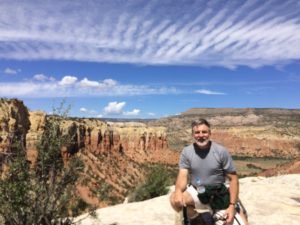 I AM NOT GOING ANYWHERE! I promise.A year ago I wrote under the title Between Two Worlds in what became a daily Lenten devotional as I teased out my own internal struggle of feeling caught between two worlds--an institutional church world that appears to be dissolving away like a sand castle on the beach and an emerging spirituality that does not yet have a consistent set of anchor points. As I emerged from the tunnel of that series I was struck by how often the language and world of religious mysticism showed up in my posts. If the Lenten devotional series was about feeling caught between two worlds the next series was to be an introduction to one world, both ancient and emerging--the world of experiential spirituality, traditionally known as religious mysticism.It felt clear to me. As a pastor in a traditional Christian denomination I could sense this call to walk with congregations in their current state while also introducing them to this new world that I was absolutely convinced represented the future of Christian spiritual community. And for nine months that worked for, sort of.
I AM NOT GOING ANYWHERE! I promise.A year ago I wrote under the title Between Two Worlds in what became a daily Lenten devotional as I teased out my own internal struggle of feeling caught between two worlds--an institutional church world that appears to be dissolving away like a sand castle on the beach and an emerging spirituality that does not yet have a consistent set of anchor points. As I emerged from the tunnel of that series I was struck by how often the language and world of religious mysticism showed up in my posts. If the Lenten devotional series was about feeling caught between two worlds the next series was to be an introduction to one world, both ancient and emerging--the world of experiential spirituality, traditionally known as religious mysticism.It felt clear to me. As a pastor in a traditional Christian denomination I could sense this call to walk with congregations in their current state while also introducing them to this new world that I was absolutely convinced represented the future of Christian spiritual community. And for nine months that worked for, sort of.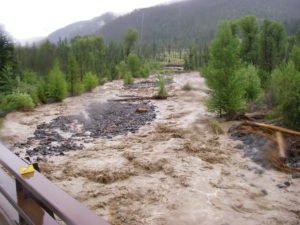 Then something happened! The world that I thought I lived in suddenly disappeared. The political, spiritual, and cultural earthquake we call Trump shook the assumptions that I had been working from. This work of introducing mysticism into our churches and culture was based on a certain amount of stability that I had assumed in our national psyche. My Mystic Monday blog was based on this ongoing assumption that I and we were living "between two worlds" and preparing to enter a new world. I did not account for or anticipate that a third world would suddenly be forced into the conversation that would radically alter my perception of my two world reality.I wrote that "the time has come..." not to inform you that I would no longer write, but that the title "Mystic Monday" had become an awkward and confining title at best. It wasn't quite working post-Trump. Rather than just easing the language of mysticism into our churches and culture I increasingly found my posts pointed directly at Trump or working through my own anger, fear and grief over the sudden loss of that which I considered good and moral and right.I am going to continue to write, but much of it will be simply trying to find my voice again. Somehow Trump has shifted my focus from trying to usher us into a new world to now trying to recover aspects of an old world--so unlike me!
Then something happened! The world that I thought I lived in suddenly disappeared. The political, spiritual, and cultural earthquake we call Trump shook the assumptions that I had been working from. This work of introducing mysticism into our churches and culture was based on a certain amount of stability that I had assumed in our national psyche. My Mystic Monday blog was based on this ongoing assumption that I and we were living "between two worlds" and preparing to enter a new world. I did not account for or anticipate that a third world would suddenly be forced into the conversation that would radically alter my perception of my two world reality.I wrote that "the time has come..." not to inform you that I would no longer write, but that the title "Mystic Monday" had become an awkward and confining title at best. It wasn't quite working post-Trump. Rather than just easing the language of mysticism into our churches and culture I increasingly found my posts pointed directly at Trump or working through my own anger, fear and grief over the sudden loss of that which I considered good and moral and right.I am going to continue to write, but much of it will be simply trying to find my voice again. Somehow Trump has shifted my focus from trying to usher us into a new world to now trying to recover aspects of an old world--so unlike me!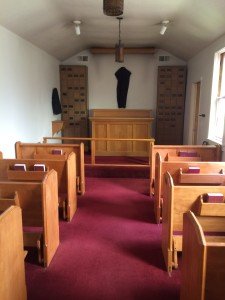 Strangely enough my Mystic Monday posts were to provide a relevant and fresh avenue in a world where the pulpit seems to have lost much of its relevance. But now that assumption has been challenged. Now I wonder if the traditional pulpit needs to be resurrected. We need recognized places where the moral and spiritual voice of the community can speak "truth to power" as has become popular. Now instead of the church needing to learn how to cross the bridge into a new world, I wonder now if they need to gather up their moral courage and restore their former prophetic voice.The world changed in recent months. I no longer feel like I am between two worlds. Now I feel like I was suddenly dropped into an alien world--a world that my religious tradition names as evil, inhumane, cruel and an offense to the God who flows through my mystical core. I am trying to hang on to the shreds of my old worldThe time has come--not to disappear--but to find once again that voice that is honest, vulnerable, truthful, courageous and hopeful. The time has come to speak to and in the context of a Trump world.I am not going anywhere. I am only trying to find my voice in this new terrain. Will you join me as we remind ourselves of what is true, recommit ourselves to that which is good, and fight to hold onto a world where kindness, honesty, and humility were strengths, not liabilities.
Strangely enough my Mystic Monday posts were to provide a relevant and fresh avenue in a world where the pulpit seems to have lost much of its relevance. But now that assumption has been challenged. Now I wonder if the traditional pulpit needs to be resurrected. We need recognized places where the moral and spiritual voice of the community can speak "truth to power" as has become popular. Now instead of the church needing to learn how to cross the bridge into a new world, I wonder now if they need to gather up their moral courage and restore their former prophetic voice.The world changed in recent months. I no longer feel like I am between two worlds. Now I feel like I was suddenly dropped into an alien world--a world that my religious tradition names as evil, inhumane, cruel and an offense to the God who flows through my mystical core. I am trying to hang on to the shreds of my old worldThe time has come--not to disappear--but to find once again that voice that is honest, vulnerable, truthful, courageous and hopeful. The time has come to speak to and in the context of a Trump world.I am not going anywhere. I am only trying to find my voice in this new terrain. Will you join me as we remind ourselves of what is true, recommit ourselves to that which is good, and fight to hold onto a world where kindness, honesty, and humility were strengths, not liabilities.
When the Terrain Changes...
Mystic Mondays February 13, 2017Dear Friends,The time has come. After ten months of writing under the Mystic Monday title I am once again needing the freedom to let my voice emerge more naturally again. I do so with some hesitation. Many of you have informed me that it's the first thing you look for on Monday mornings. There is nothing as satisfying for a writer than knowing that people are anticipating the next thing you might write. I suppose that is part of the reason for freeing myself up.I had anticipated that I would do more introduce you to the world of religious mysticism and the ways that many of us are already practicing it without the benefit or the burden of the name. But honestly, the whole Trump blitzkrieg flooded my soul and consciousness many weeks. I had to write my way through that or risk letting having the psychic toxins poison my whole being. My voice is feeling muddied and it's time to clean it up again. But there is more to it than that. The Rome to Rumi book is begging to be written. I am also preparing for what has become my every two to three year job search as I near the end of my current interim. With that I am finding myself once again pondering just where I belong. I am receiving calls to work with churches that are in need of transformational leadership. At the same time that I am receiving more invitations to lead workshops, write blog posts for other media, do soul coaching, and lead pilgrimages. Right now it's hard to know which path to take.One year ago I wrote under the blog title "Between Two Worlds" in a daily Lenten devotional where I shared my struggle with feeling caught between a religious institution that seems to be eroding away and an emerging spiritual consciousness that is forming but has little structure. But if I felt stuck between the two in the past with no sense of belonging in either, now I feel pulled from both directions. It seems that I have established my credibility to speak to both and now my challenge is whether to lean more toward one world than the other. There is more financial and professional stability in serving the church, but less of a long term future. And being part of the emerging world of spiritual community is titillating, but at least for now it doesn't put the beans and rice on the table.But despite letting the Mystic Monday post go I can promise you that I will continue to blog and write on a fairly regular basis. What has changed is that I now need to remove the stricture of the Mystic Monday theme and let my posts and themes come to me again more naturally. In recent weeks to column has felt more forced.There would have been a time when I would have seen this as a failure of sorts. But not today. I think my two pilgrimages taught me this. The soul doesn't operate on a predictable and exact schedule. Like growth spurts, the soul seems to have long fallow periods and then a sudden surge of creative juices that may last for weeks or months.I remember when this happened on my Rome to Rumi pilgrimage. I had made a general plan to ride from Rome, Italy to Konya, Turkey, passing through the northern part of Greece. I began the trip naively thinking that I was doing it more for the community than I was for myself. That became apparent just a week or so into the journey as I struggled with internet issues and briefly toyed with the idea that the trek was not even worth it if I couldn't blog about it on a daily basis. Silly me!
But there is more to it than that. The Rome to Rumi book is begging to be written. I am also preparing for what has become my every two to three year job search as I near the end of my current interim. With that I am finding myself once again pondering just where I belong. I am receiving calls to work with churches that are in need of transformational leadership. At the same time that I am receiving more invitations to lead workshops, write blog posts for other media, do soul coaching, and lead pilgrimages. Right now it's hard to know which path to take.One year ago I wrote under the blog title "Between Two Worlds" in a daily Lenten devotional where I shared my struggle with feeling caught between a religious institution that seems to be eroding away and an emerging spiritual consciousness that is forming but has little structure. But if I felt stuck between the two in the past with no sense of belonging in either, now I feel pulled from both directions. It seems that I have established my credibility to speak to both and now my challenge is whether to lean more toward one world than the other. There is more financial and professional stability in serving the church, but less of a long term future. And being part of the emerging world of spiritual community is titillating, but at least for now it doesn't put the beans and rice on the table.But despite letting the Mystic Monday post go I can promise you that I will continue to blog and write on a fairly regular basis. What has changed is that I now need to remove the stricture of the Mystic Monday theme and let my posts and themes come to me again more naturally. In recent weeks to column has felt more forced.There would have been a time when I would have seen this as a failure of sorts. But not today. I think my two pilgrimages taught me this. The soul doesn't operate on a predictable and exact schedule. Like growth spurts, the soul seems to have long fallow periods and then a sudden surge of creative juices that may last for weeks or months.I remember when this happened on my Rome to Rumi pilgrimage. I had made a general plan to ride from Rome, Italy to Konya, Turkey, passing through the northern part of Greece. I began the trip naively thinking that I was doing it more for the community than I was for myself. That became apparent just a week or so into the journey as I struggled with internet issues and briefly toyed with the idea that the trek was not even worth it if I couldn't blog about it on a daily basis. Silly me!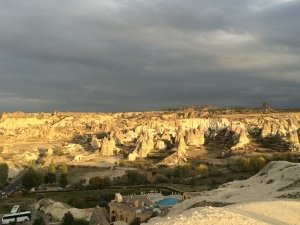 I soon righted my thinking and spent the next four weeks in physically and spiritually challenging terrain. And then, as pilgrimages do, things shifted again. Just before arriving in Istanbul I realized that my deepest pilgrimage work was done, but I was still a full 400 miles from my destination in Konya. The terrain south of Istanbul was both unfamiliar and felt like just an obstacle between where I was and where I wanted to go. I switched up my plans, took a bus to the biking paradise of Cappadokia, famous for their hot air balloon rides, chimney rocks, and ancient Christian cliff dwellings and then rode the last 200 miles into Konya as planned. My soul knew what what it wanted even if it didn't fit my original plans.I say this because I have this sense that I am on some sort of a life-long spiritual pilgrimage with regards to the future of the church, spiritual community and religious mysticism. For a few miles (and a few weeks) it felt exactly right to write under the title of "Between Two Worlds" last Lent. Then for a few more miles (months actually) the Mystic Monday title worked, although awkwardly as political forces muddied the waters more than once. Now I am in new terrain once again. The landscape has changed. New opportunities are opening up ahead of me. Financial considerations will once again dictate much of what I can do and can't do. And that Rome to Rumi book is pestering me more and more and getting tired of being put off.I assure you, I am not going away. Mystic Mondays is just taking a break. But this pilgrimage of discovery continues. Our work is not done yet.
I soon righted my thinking and spent the next four weeks in physically and spiritually challenging terrain. And then, as pilgrimages do, things shifted again. Just before arriving in Istanbul I realized that my deepest pilgrimage work was done, but I was still a full 400 miles from my destination in Konya. The terrain south of Istanbul was both unfamiliar and felt like just an obstacle between where I was and where I wanted to go. I switched up my plans, took a bus to the biking paradise of Cappadokia, famous for their hot air balloon rides, chimney rocks, and ancient Christian cliff dwellings and then rode the last 200 miles into Konya as planned. My soul knew what what it wanted even if it didn't fit my original plans.I say this because I have this sense that I am on some sort of a life-long spiritual pilgrimage with regards to the future of the church, spiritual community and religious mysticism. For a few miles (and a few weeks) it felt exactly right to write under the title of "Between Two Worlds" last Lent. Then for a few more miles (months actually) the Mystic Monday title worked, although awkwardly as political forces muddied the waters more than once. Now I am in new terrain once again. The landscape has changed. New opportunities are opening up ahead of me. Financial considerations will once again dictate much of what I can do and can't do. And that Rome to Rumi book is pestering me more and more and getting tired of being put off.I assure you, I am not going away. Mystic Mondays is just taking a break. But this pilgrimage of discovery continues. Our work is not done yet.
Pray continuously--really?
Mystic Mondays February 6, 2017"Rejoice always, pray without ceasing, give thanks in all circumstances..." 1 Thessalonians 5: 16-18I don't quote a lot of scripture in my blog, partly because the world of spiritual truth has come to me from so many places in recent years--chance encounters, something I overheard at the checkout stand, and other wisdom literature besides the Bible. I also don't quote scripture a great deal because my readers are an eclectic bunch of folks--some who keep the pews warm on a regular basis as well as those whose “church” is on the beach, in the mountains, or sitting with a friend over a good glass of Merlot.But there is one line in this passage that tells a story of my own spiritual development--"Pray without ceasing." Quite honestly the "rejoice always" and "give thanks in all circumstances" is still baffling to me. I am too much of a believer in calling sadness sadness. And some things are just too damn painful and ugly to be thankful for. But this whole "pray without ceasing" thing is starting to make sense to me. Years ago (okay, decades) the only context I had for understanding this line came from my rather narrow view of prayer. I thought I knew what prayer was. Prayer was that time when you sat with your head bowed while the pastor droned on with a whole laundry list of requests. Prayer was the "God is great. God is good. Let us thank Him for our food," that we rushed through before dinner at youth group meetings. Prayer was anything that was said after the words, "Dear God..."Funny thing has been happening in recent years. With the exception of my professional role as a pastor those types of prayers are decreasing in use and a different kind of prayer is increasing. While the admonition to "pray without ceasing" felt at one time to be a kind of impossible goal that only cloistered monks could even attempt, today I see it as a possibility. A far off possibility, but a possibility nonetheless.Prayer for me has become less an act of talking to God (or whatever Spirit floats around this Universe) and more of a constant attempt to align myself with the Soul of Life. This is all going to sound rather New Agey and ethereal, but I know of no other way to describe this shift I can feel in my body and soul. Prayer is becoming more about my attempts to enter into the reality of Life, a reality that often lies under the surface of the actual words and messages we send. Prayer is a disposition I hold toward the hours of day rather than an activity I have to add to my day.
But this whole "pray without ceasing" thing is starting to make sense to me. Years ago (okay, decades) the only context I had for understanding this line came from my rather narrow view of prayer. I thought I knew what prayer was. Prayer was that time when you sat with your head bowed while the pastor droned on with a whole laundry list of requests. Prayer was the "God is great. God is good. Let us thank Him for our food," that we rushed through before dinner at youth group meetings. Prayer was anything that was said after the words, "Dear God..."Funny thing has been happening in recent years. With the exception of my professional role as a pastor those types of prayers are decreasing in use and a different kind of prayer is increasing. While the admonition to "pray without ceasing" felt at one time to be a kind of impossible goal that only cloistered monks could even attempt, today I see it as a possibility. A far off possibility, but a possibility nonetheless.Prayer for me has become less an act of talking to God (or whatever Spirit floats around this Universe) and more of a constant attempt to align myself with the Soul of Life. This is all going to sound rather New Agey and ethereal, but I know of no other way to describe this shift I can feel in my body and soul. Prayer is becoming more about my attempts to enter into the reality of Life, a reality that often lies under the surface of the actual words and messages we send. Prayer is a disposition I hold toward the hours of day rather than an activity I have to add to my day. Somehow the words prayer and presence seem deeply wedded to each other. The more I approach a situation or a person with a prayerful attitude the more I feel present. The vice versa is also true. The more I try to be deeply, emotionally, and soulfully present to another person the more the encounter feels like a form of shared prayer.I am coming to experience that prayer is not an act of trying to talk to God as if God was on the other end of a phone call. Prayer is not a request I shoot up to the heavens. Prayer is beginning to feel like lying in my lover's arms-where no words need be spoken, knowing glances are shared in a delicious intimacy, and hearts beat as one.And what's amazing--and why I am beginning to believe that this whole pray without ceasing thing is possible--is that that intimate feeling with Life is possible anywhere anytime. It doesn't have to just be before a meal, in a church, or at the foot of one's bed. It doesn't have to begin with any particular prescribed words. Often it is as simple as taking a few really deep cleansing breaths, shedding the layers of crud from our mind and heart, and entering the deeper reality that is before us.I used to believe that one could not pray without ceasing because there were other things to attend to as well. How would I ever shop and spend time with friends and exercise if all I did was pray? How would pay bills, make a living and take care of my house if I spent all day in prayer.But now I don’t see it that way. Prayer doesn’t compete with the activities of life. It deepens them. Prayer is not an extra activity to add to life. Prayer is the sacred window through which we look at life.Pray without ceasing. And if that is too much for you, then just take a really deep, cleansing breath, and then another, and another, one after another, all day long. Breathe until your breaths turn into prayers. Then don’t stop.
Somehow the words prayer and presence seem deeply wedded to each other. The more I approach a situation or a person with a prayerful attitude the more I feel present. The vice versa is also true. The more I try to be deeply, emotionally, and soulfully present to another person the more the encounter feels like a form of shared prayer.I am coming to experience that prayer is not an act of trying to talk to God as if God was on the other end of a phone call. Prayer is not a request I shoot up to the heavens. Prayer is beginning to feel like lying in my lover's arms-where no words need be spoken, knowing glances are shared in a delicious intimacy, and hearts beat as one.And what's amazing--and why I am beginning to believe that this whole pray without ceasing thing is possible--is that that intimate feeling with Life is possible anywhere anytime. It doesn't have to just be before a meal, in a church, or at the foot of one's bed. It doesn't have to begin with any particular prescribed words. Often it is as simple as taking a few really deep cleansing breaths, shedding the layers of crud from our mind and heart, and entering the deeper reality that is before us.I used to believe that one could not pray without ceasing because there were other things to attend to as well. How would I ever shop and spend time with friends and exercise if all I did was pray? How would pay bills, make a living and take care of my house if I spent all day in prayer.But now I don’t see it that way. Prayer doesn’t compete with the activities of life. It deepens them. Prayer is not an extra activity to add to life. Prayer is the sacred window through which we look at life.Pray without ceasing. And if that is too much for you, then just take a really deep, cleansing breath, and then another, and another, one after another, all day long. Breathe until your breaths turn into prayers. Then don’t stop.
Drum, Dance and Sing!
Mystic Mondays January 30, 2017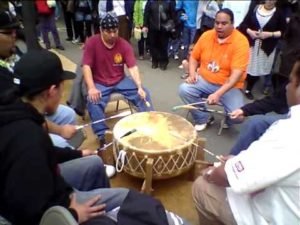 "Drums, Dancing and Singing."Those were the words that a friend shared me with as we talked about how to survive this time. Both of us were feeling that the very foundation of what we thought was American was falling away like chunks of an iceberg during a spring thaw. I was sharing how the impact of the swift and brutal changes was leaving me alternating between a deep rage and numbness. At this she said, "You know the Native Americans, who have lived with centuries' worth of national trauma, have a saying: 'Every day drum, dance and sing--every day!'"It didn't take a doctor or advice from a friend to get me there. Already in recent weeks I had made it a goal to exercise daily, practice some therapeutic yoga, and pluck away on the guitar. Of course, the day often gets away from me, but more days than not I get to the gym to join others in a spinning class or take a walk through the cow and horse pastures near my home and get a few minutes of guitar practice. I never miss my yoga!
"Drums, Dancing and Singing."Those were the words that a friend shared me with as we talked about how to survive this time. Both of us were feeling that the very foundation of what we thought was American was falling away like chunks of an iceberg during a spring thaw. I was sharing how the impact of the swift and brutal changes was leaving me alternating between a deep rage and numbness. At this she said, "You know the Native Americans, who have lived with centuries' worth of national trauma, have a saying: 'Every day drum, dance and sing--every day!'"It didn't take a doctor or advice from a friend to get me there. Already in recent weeks I had made it a goal to exercise daily, practice some therapeutic yoga, and pluck away on the guitar. Of course, the day often gets away from me, but more days than not I get to the gym to join others in a spinning class or take a walk through the cow and horse pastures near my home and get a few minutes of guitar practice. I never miss my yoga! I always knew that these things were good for me. Doctors remind us to take care of ourselves--eat well and exercise regularly. Pastors remind their flocks that Christian living isn't all serving, but also enjoying God's creation. Exercise gurus remind us that we will live longer if our bodies are healthier.But never have I felt the need to commit to these daily disciplines like I do now. This has to do with keeping my sanity. I wished I could say that I am offering that slightly tongue in cheek, but I am not. I am quite sure that I mean that in a clinical sense! I have to slip a handful of daily joys into my life or this madness will sweep me away.I am baffled beyond comprehension by what is happening to our country: Precious presidential hours spent on crowd sizes, alternative facts (can those two words go together, really?), travel bans that serve to help in terrorist recruitment rather than to curb it, and confused, nonsensical jibberish-talk from the president. I have a spend my whole working life dealing with difficult people and situations and I have to admit, I presently don't have the tools to deal with this.
I always knew that these things were good for me. Doctors remind us to take care of ourselves--eat well and exercise regularly. Pastors remind their flocks that Christian living isn't all serving, but also enjoying God's creation. Exercise gurus remind us that we will live longer if our bodies are healthier.But never have I felt the need to commit to these daily disciplines like I do now. This has to do with keeping my sanity. I wished I could say that I am offering that slightly tongue in cheek, but I am not. I am quite sure that I mean that in a clinical sense! I have to slip a handful of daily joys into my life or this madness will sweep me away.I am baffled beyond comprehension by what is happening to our country: Precious presidential hours spent on crowd sizes, alternative facts (can those two words go together, really?), travel bans that serve to help in terrorist recruitment rather than to curb it, and confused, nonsensical jibberish-talk from the president. I have a spend my whole working life dealing with difficult people and situations and I have to admit, I presently don't have the tools to deal with this. I have a friend who is one of the brightest people I know who recently admitted, "There is a darkness emerging from me that I never knew was there. I have never felt such rage nor ever experienced such dark thoughts. How are people coping?" I told her she wasn't alone and then shared that I have had to resort to a daily dose of goodness--cycling, walking, yoga, beer, chocolate, singing and guitar. Another friend who has been at the forefront of social justice work said he too was resorting to simple pleasures--time with family, fly fishing, a good bottle of wine, a day in the forest.Of course we are saying the same thing that the Native American motto has long advised--"Drum, dance and sing--every day!" I used to think of those things as adding richness to my life. Now I think of them as survival tools. Now I think of them as holding on to what is good in a world that is rapidly slipping away.But these reminders tell me something. They tell me that I am in for the long haul on this. This is not a retreat. This sudden commitment to carve out a portion of each day for joy and pleasure and goodness comes from the realization that recovering a compassionate politics and a just society isn't going to happen with a single million-person march, or a seven-week series of inspiring sermons or a signed petition to our senator.This battle will take years, maybe my whole working life, and possibly to my dying day. This isn't going to be one of those endeavors that we put heart and soul and body and mind into and then rest and relax and enjoy when we are finally done. This is not one of those times we can sprint to finish line with one dedicated burst of energy. This will be a marathon. We will have to pace ourselves. We will have to even smell the roses along the way.Drum, dance and sing now. Why? Because that's how we'll survive. Why? Because those are the things worth fighting for.
I have a friend who is one of the brightest people I know who recently admitted, "There is a darkness emerging from me that I never knew was there. I have never felt such rage nor ever experienced such dark thoughts. How are people coping?" I told her she wasn't alone and then shared that I have had to resort to a daily dose of goodness--cycling, walking, yoga, beer, chocolate, singing and guitar. Another friend who has been at the forefront of social justice work said he too was resorting to simple pleasures--time with family, fly fishing, a good bottle of wine, a day in the forest.Of course we are saying the same thing that the Native American motto has long advised--"Drum, dance and sing--every day!" I used to think of those things as adding richness to my life. Now I think of them as survival tools. Now I think of them as holding on to what is good in a world that is rapidly slipping away.But these reminders tell me something. They tell me that I am in for the long haul on this. This is not a retreat. This sudden commitment to carve out a portion of each day for joy and pleasure and goodness comes from the realization that recovering a compassionate politics and a just society isn't going to happen with a single million-person march, or a seven-week series of inspiring sermons or a signed petition to our senator.This battle will take years, maybe my whole working life, and possibly to my dying day. This isn't going to be one of those endeavors that we put heart and soul and body and mind into and then rest and relax and enjoy when we are finally done. This is not one of those times we can sprint to finish line with one dedicated burst of energy. This will be a marathon. We will have to pace ourselves. We will have to even smell the roses along the way.Drum, dance and sing now. Why? Because that's how we'll survive. Why? Because those are the things worth fighting for.
Wonder and Wondering...
Mystic Mondays January 23, 2017
"Without wonder there is little depth of presence."
This is the line I read a few days ago from John O'Donohue's book Eternal Echoes, the book I am currently using for my morning meditation time. I immediately stopped reading. The line spoke a truth I had not pondered before. But I knew immediately that it spoke a truth that I was ready to hear. It has been swirling around in my head and heart for nearly a full week now. But I have a confession to make. I made five full attempts to write about this quote--each time with little success. I couldn't figure out what the block was. I would write, delete, write again, delete, etc. Finally it hit me. I was trying to put to words and define and unravel this quote as if my words would bring it to life. I was taking the topic of wonder and writing the wonder right out of it. It was as if I had dissected and parsed the word mystery until I had wrung out and squeezed all the mystery right out of it.So today I am just going to leave you with the same questions that I have been pondering all week, but haven't given any succinct answers. This has been a week-long meditation that instead of resolving itself neatly has rather become broader and fallen deeper into my soul each day.Here are my questions:
But I have a confession to make. I made five full attempts to write about this quote--each time with little success. I couldn't figure out what the block was. I would write, delete, write again, delete, etc. Finally it hit me. I was trying to put to words and define and unravel this quote as if my words would bring it to life. I was taking the topic of wonder and writing the wonder right out of it. It was as if I had dissected and parsed the word mystery until I had wrung out and squeezed all the mystery right out of it.So today I am just going to leave you with the same questions that I have been pondering all week, but haven't given any succinct answers. This has been a week-long meditation that instead of resolving itself neatly has rather become broader and fallen deeper into my soul each day.Here are my questions:
- When you are with friends and family do you look at them through the eyes of wonder?
- Is the world already solved for you or is there room for a lifetime of curiosity and discovery?
- Do you see people as predictable personality types or as abstract works of art that have many possible meanings?
- Are you comfortable living life with ambiguity and uncertainty?
- Do you feel the need to solve life's challenges or is it possible to embrace challenges as friends?
- Are you comfortable living into the Mystery of it all without any assurances?
Maybe next week I'll have more to say (or maybe not).Until then I am still pondering and wondering...
January 21-March or Mountains?
Mystic Mondays January 16, 2017Tough decision--March or Mountains?On Saturday, January 21 (yes, that January 21 hours after the inauguration) I am sponsoring a ranger-guided snowshoe trip up at Crater Lake (if they re-open after getting too much snow!) Like me, this handful of Earth Adventurers went back and forth. "Do I go up and enjoy a magical day in the snow or do I join the Women's March in Ashland,” they asked themselves.Strangely, torn as I was, I was not as torn about the conflict as I might have been in the past. I might have foregone a trip up into the snow or a day at the beach or a hike in the woods if some urgent activist opportunity had presented itself. I have participated in a handful of protests and marches over the years. I am not one to show up at every protest as if it is a weekend hobby, but I have felt a deep moral obligation to participate in some where my conscience demanded it. But as strongly as I feel this time I didn't find myself automatically carving out the day to join my sisters in Ashland.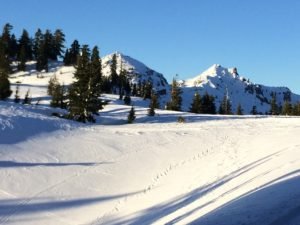 So what was different this time. The truth is I would love to join those who are marching for "humanitarian rights, the environment and marginalized people everywhere" as the Ashland Daily Tidings article describes. But just as badly I need to immerse myself in beauty and goodness. I need to tromp through two feet of new fluffy powder and feel the cold frigid air shock my lungs. I need to take in the Christmas card snapshot of tree bows loaded down with bean bag-size clumps of snow. I need to stop and gaze at the glistening reflection of a high mountain sun bouncing off the blinding snow.As the weeks have passed since the T-man's election I have found myself vacillating between the engaged determination of an activist and the Om-humming contemplation of a Buddhist monk. Strangely enough both feel like faithful responses to the terrifying developments that have fallen on our country like an unexpected outer space asteroid. In the past a retreat to the mountains would have felt like a copout to me. "Who has the luxury of soul prayer in a dangerous time like this," I might have scolded myself. "This isn't the time for sitting on my butt. This is a time for action!"But not this time. I need both. Something in me demands both. This is soul survival.If I only withdraw from the ugliness of this time I would forever beat myself up for whatever sins I commit by the act of omission. On the other hand, I know that if lose touch with beauty and goodness and mystery and magic I will die. And I am pretty sure that I don't just mean that metaphorically. One must have hope to survive. One must have an innate belief that the "great moral arc of history" really does bend toward justice, peace and goodness. Without hope our spirit dies and, sometimes, our bodies follow. This snowshoe trip doesn’t feel like an option. I have to dig deep and hold onto LIFE.In a few days some of the nation will be gathered in large groups in Washington D.C., New York City, Portland, and even little Ashland just south of my home. They will march and protest on behalf of all marginalized people everywhere. If the big "T" puts actions to his words a whole helluva a lot activism is going to be needed. And I will be there.
So what was different this time. The truth is I would love to join those who are marching for "humanitarian rights, the environment and marginalized people everywhere" as the Ashland Daily Tidings article describes. But just as badly I need to immerse myself in beauty and goodness. I need to tromp through two feet of new fluffy powder and feel the cold frigid air shock my lungs. I need to take in the Christmas card snapshot of tree bows loaded down with bean bag-size clumps of snow. I need to stop and gaze at the glistening reflection of a high mountain sun bouncing off the blinding snow.As the weeks have passed since the T-man's election I have found myself vacillating between the engaged determination of an activist and the Om-humming contemplation of a Buddhist monk. Strangely enough both feel like faithful responses to the terrifying developments that have fallen on our country like an unexpected outer space asteroid. In the past a retreat to the mountains would have felt like a copout to me. "Who has the luxury of soul prayer in a dangerous time like this," I might have scolded myself. "This isn't the time for sitting on my butt. This is a time for action!"But not this time. I need both. Something in me demands both. This is soul survival.If I only withdraw from the ugliness of this time I would forever beat myself up for whatever sins I commit by the act of omission. On the other hand, I know that if lose touch with beauty and goodness and mystery and magic I will die. And I am pretty sure that I don't just mean that metaphorically. One must have hope to survive. One must have an innate belief that the "great moral arc of history" really does bend toward justice, peace and goodness. Without hope our spirit dies and, sometimes, our bodies follow. This snowshoe trip doesn’t feel like an option. I have to dig deep and hold onto LIFE.In a few days some of the nation will be gathered in large groups in Washington D.C., New York City, Portland, and even little Ashland just south of my home. They will march and protest on behalf of all marginalized people everywhere. If the big "T" puts actions to his words a whole helluva a lot activism is going to be needed. And I will be there. But I believe that twenty five of us on Saturday will protest in our way. It is a protest against the insanity, the ugliness, and the terror of this time. Rather than fight against the darkness this day (there will be more to come I fear) we will enjoy the light. We will drive skyward up to Crater Lake and snowshoe on the eight feet of new snow received this past week. We will breathe the pure frigid mountain air deep into our lungs as a way of purifying. We will laugh and sing and take pictures together. Some of us might throw snowballs, lie in the fluffy stuff and make angels, and, if brave enough, wrestle each other to the ground like we did as children. We will remember when the world was still full of delight, hope and magic.It won’t be enough to just to fight against the darkness this time. We also will have to hold onto the light, lest we forget. We can’t forget. We have to fight, but we also have to remember. We have to march, but we can't forget to snowshoe, drink good wine, play like children, and make love. Fight the ugliness, but also hold onto the beauty.
But I believe that twenty five of us on Saturday will protest in our way. It is a protest against the insanity, the ugliness, and the terror of this time. Rather than fight against the darkness this day (there will be more to come I fear) we will enjoy the light. We will drive skyward up to Crater Lake and snowshoe on the eight feet of new snow received this past week. We will breathe the pure frigid mountain air deep into our lungs as a way of purifying. We will laugh and sing and take pictures together. Some of us might throw snowballs, lie in the fluffy stuff and make angels, and, if brave enough, wrestle each other to the ground like we did as children. We will remember when the world was still full of delight, hope and magic.It won’t be enough to just to fight against the darkness this time. We also will have to hold onto the light, lest we forget. We can’t forget. We have to fight, but we also have to remember. We have to march, but we can't forget to snowshoe, drink good wine, play like children, and make love. Fight the ugliness, but also hold onto the beauty.
How the Pulpit Became Political
Mystic Mondays January 9, 2017"Remember, you yourselves were once strangers in the land of Egypt." Ex. 22: 21Today I preached a sermon at the church where I am currently serving as an interim pastor. I was preaching on the first part of their new mission statement, "Welcoming all, as God's people, on our journeys of faith." Speaking to the first phrase, "welcoming all" I reminded my congregation that it is an essential part of the Judeo-Christian narrative to be welcoming to the stranger, the different, the alien and the outcast among us.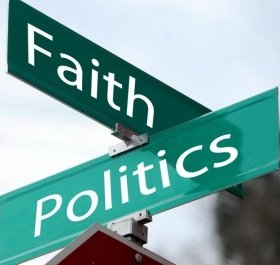 In any other context and time I think my sermon would have been heard as a good reminder to what makes us church. It would have been heard as a purely spiritual message of how we learn to live more deeply into our Christian character. It would have been pulpit preaching at its most normative.But a strange thing has been happening in my sermons. Despite no manipulative maneuvering on my part most of my sermons feel like they have a political angle to them. The pulpit is feeling political no matter what I say.I have for years offered the same benediction at the end of the service. It used to be a feel good benediction and charge to the congregation to go out and live the words that we had prayed, sung and heard in the service. But now not so much. They sound political. They sound like a charge to go into battle.I never intended it this way, but I can hear the words in my own head. With my arms raised in the typical blessing style I say, "Strengthen the fainthearted, support the weak, and help the suffering," and I can't help but feel like I am making a political statement. I can't help but to think I am drawing a line in the sand and saying, "Mr. Trump you can't steal this from us. We are going to fight you on this one."
In any other context and time I think my sermon would have been heard as a good reminder to what makes us church. It would have been heard as a purely spiritual message of how we learn to live more deeply into our Christian character. It would have been pulpit preaching at its most normative.But a strange thing has been happening in my sermons. Despite no manipulative maneuvering on my part most of my sermons feel like they have a political angle to them. The pulpit is feeling political no matter what I say.I have for years offered the same benediction at the end of the service. It used to be a feel good benediction and charge to the congregation to go out and live the words that we had prayed, sung and heard in the service. But now not so much. They sound political. They sound like a charge to go into battle.I never intended it this way, but I can hear the words in my own head. With my arms raised in the typical blessing style I say, "Strengthen the fainthearted, support the weak, and help the suffering," and I can't help but feel like I am making a political statement. I can't help but to think I am drawing a line in the sand and saying, "Mr. Trump you can't steal this from us. We are going to fight you on this one." And the funny thing is this happened with no change on my part. My preaching hasn't changed at all. I am preaching the same messages I have preached for a twenty years. But now they sound different. The context has changed. Our ears hear a different message. New images pop up in our heads that weren't there before.When we sing, "Jesus loves the little children, all the children of the world, red and yellow, black and white..." it doesn't sound so innocent anymore. It sounds like we are taking a stand. It sounds like we are facing off with a political figure and movement. It sounds like we are marching into war.But WE haven't changed the words. Mr. Trump changed the context (or at least exposed a hidden, festering underground people).I say, "Jesus calls us to honor the dignity of every person" and it sounds like I am calling Trump out for mocking a disabled reporter.I say, "Remember, we were once strangers in the land of Egypt" and it sounds like I am protesting the policies of Trump and his supporters.I say, "Jesus had a way of treating each person like a human being," and it sounds like I am looking for a way to embarrass this locker-room-talking, pussy-grabbing president elect.I say, "We are our brother's and sister's keeper," and it sounds like I am speaking specifically about the refugee and immigration crisis.I say "Repay no one evil for evil," and it sounds like I saying, "Don't stoop to Mr. Trump's lows."Some may accuse me of suddenly making my pulpit political and sticking my nose in where it doesn't belong. But I am struck by the fact that nothing has changed for me. I am still preaching the same gospel message:"Love your neighbor as yourself.""Take care of the stranger among you because once you were that stranger and God took care of you.""Practice humility and mercy toward each other.""Forgive us our debts as we forgive our debtors.""Honor everyone."I never intended for this to be political. But maybe that's the power of gospel. It doesn't care about the lines between religion and politics, convention and political correctness. The gospel just shines a light into dark places and exposes our fallen natures.
And the funny thing is this happened with no change on my part. My preaching hasn't changed at all. I am preaching the same messages I have preached for a twenty years. But now they sound different. The context has changed. Our ears hear a different message. New images pop up in our heads that weren't there before.When we sing, "Jesus loves the little children, all the children of the world, red and yellow, black and white..." it doesn't sound so innocent anymore. It sounds like we are taking a stand. It sounds like we are facing off with a political figure and movement. It sounds like we are marching into war.But WE haven't changed the words. Mr. Trump changed the context (or at least exposed a hidden, festering underground people).I say, "Jesus calls us to honor the dignity of every person" and it sounds like I am calling Trump out for mocking a disabled reporter.I say, "Remember, we were once strangers in the land of Egypt" and it sounds like I am protesting the policies of Trump and his supporters.I say, "Jesus had a way of treating each person like a human being," and it sounds like I am looking for a way to embarrass this locker-room-talking, pussy-grabbing president elect.I say, "We are our brother's and sister's keeper," and it sounds like I am speaking specifically about the refugee and immigration crisis.I say "Repay no one evil for evil," and it sounds like I saying, "Don't stoop to Mr. Trump's lows."Some may accuse me of suddenly making my pulpit political and sticking my nose in where it doesn't belong. But I am struck by the fact that nothing has changed for me. I am still preaching the same gospel message:"Love your neighbor as yourself.""Take care of the stranger among you because once you were that stranger and God took care of you.""Practice humility and mercy toward each other.""Forgive us our debts as we forgive our debtors.""Honor everyone."I never intended for this to be political. But maybe that's the power of gospel. It doesn't care about the lines between religion and politics, convention and political correctness. The gospel just shines a light into dark places and exposes our fallen natures. I don't even mention Trump by name from the pulpit, but it's as if he has found a way to get into the subtext of my sermons. I can't keep him out if I tried. He has written himself into every home and every person's subconscious. I didn't invite him. He pushed his way in.I am sorry Mr. Trump, I am not trying to single you out from the pulpit. You have singled yourself out with your behavior. And this gospel that I have been preaching is now pointing a great big ole' floodlight in your orange-ish direction. And despite your love of the limelight this is one light that doesn't make you look good. In fact it makes you look small, petty, and desperate.Mr. Trump you haven't changed me. I am a Christian minister. I will always be a Christian minister. Someday you may need my (or a colleague's) services. And my hope is that when your final day comes that I can say with integrity, as I do at many memorial services, "Well done, good and faithful servant. Enter into the joy of your Lord."But Mr. Trump I won't lie for you. My job is to preach the gospel. Your job is to make a good faith effort to live up to it. And then, on your final day, my job is to tell the story. Please give me a better story. I won't make it up for you. You have to live it first.
I don't even mention Trump by name from the pulpit, but it's as if he has found a way to get into the subtext of my sermons. I can't keep him out if I tried. He has written himself into every home and every person's subconscious. I didn't invite him. He pushed his way in.I am sorry Mr. Trump, I am not trying to single you out from the pulpit. You have singled yourself out with your behavior. And this gospel that I have been preaching is now pointing a great big ole' floodlight in your orange-ish direction. And despite your love of the limelight this is one light that doesn't make you look good. In fact it makes you look small, petty, and desperate.Mr. Trump you haven't changed me. I am a Christian minister. I will always be a Christian minister. Someday you may need my (or a colleague's) services. And my hope is that when your final day comes that I can say with integrity, as I do at many memorial services, "Well done, good and faithful servant. Enter into the joy of your Lord."But Mr. Trump I won't lie for you. My job is to preach the gospel. Your job is to make a good faith effort to live up to it. And then, on your final day, my job is to tell the story. Please give me a better story. I won't make it up for you. You have to live it first.
"Compassion, Brian, Compassion"
Mystic Mondays January 2, 2017 (Post-Vacation Edition)Compassion. That was the word that kept coming back to me as I crawled my way down the interstate during a wet winter snowstorm on the last day of my annual Christmas vacation.The vacation provided me with a much-needed reprieve from the whirlwind of swirling emotions that had sucked me in in the wake of the Trump phenomenon. Before my break I had an almost obsessive need to follow every unpredictable word, every 144-character presidential tweet, and every jolting cabinet choice that he was making. But for eight straight days--Christmas through New Year's--I stepped off the Trump treadmill and played with my two year-old grandson, shared holiday meals and goodies with family, snowshoed on the Crater Lake Rim under stars, and inexpertly plucked away at the six strings of my guitar, sometimes even making it sound like music.I am now sitting in a restaurant ironically named Heaven on Earth just off of Interstate 5 waiting for the two lines of parked cars to budge again after three wrecks ahead of us shut the interstate down. I am just hours from needing to make the transition from a rich diet of soulful refreshment back into a world that just one week ago had me trapped on a dizzying merry-go-round with Crazy World blaring on the speakers and the attendant explaining that there was no stop button on this ride.I fear getting back and stepping once again into the fear, the anger, the grief, and the cynicism that had grabbed me by the hair and would not let go. I fear that the peace, the goodness, and the beauty that radiated in me and around me on these glorious eight days of vacation will evaporate as fast as the first drops of rain on a sizzling patch of hot August pavement.But one word keeps nagging at me, nudging me and even pestering me a little. "Compassion. Step back into this crazy, confusing and frightening world with compassion," the voice seems to be saying. "You've fought with anger, biting sarcasm, and deep grief. But now it's time to arm yourself with compassion."
But for eight straight days--Christmas through New Year's--I stepped off the Trump treadmill and played with my two year-old grandson, shared holiday meals and goodies with family, snowshoed on the Crater Lake Rim under stars, and inexpertly plucked away at the six strings of my guitar, sometimes even making it sound like music.I am now sitting in a restaurant ironically named Heaven on Earth just off of Interstate 5 waiting for the two lines of parked cars to budge again after three wrecks ahead of us shut the interstate down. I am just hours from needing to make the transition from a rich diet of soulful refreshment back into a world that just one week ago had me trapped on a dizzying merry-go-round with Crazy World blaring on the speakers and the attendant explaining that there was no stop button on this ride.I fear getting back and stepping once again into the fear, the anger, the grief, and the cynicism that had grabbed me by the hair and would not let go. I fear that the peace, the goodness, and the beauty that radiated in me and around me on these glorious eight days of vacation will evaporate as fast as the first drops of rain on a sizzling patch of hot August pavement.But one word keeps nagging at me, nudging me and even pestering me a little. "Compassion. Step back into this crazy, confusing and frightening world with compassion," the voice seems to be saying. "You've fought with anger, biting sarcasm, and deep grief. But now it's time to arm yourself with compassion." But I want to make one thing very clear. This call to compassion is not a retreat from the ugly and dirty duty of fighting for what is right, good, just, graceful, and life-affirming. This is not a shrinking back from the messy affairs of religion and politics. This is not an abdication of our basic human responsibility to look out for the dispossessed, the marginalized, the minority, the immigrant, the outcast and vilified.This is just a recognition that anger, fear and cynicism are not the weapons that my soul most desires. I cannot let the poison that has entered our national bloodstream also poison my own soul. If a fight is on the near horizon I am no better than my perceived opponent if I resort to the same weapons that have had me so tied up in knots.Gandhi has been famously quoted as saying, "An eye for an eye and a tooth for a tooth just leaves the world blind and toothless." Fighting anger with anger gets us nowhere. Outbidding a fear-monger with just more fear leaves us all scared of our own shadows.I have had eight days of refreshment. I have nourished my soul with sparkling white wintry powder. I have been reminded of the importance of family. I have held loved ones close. I have laughed at silliness and cried at shared pain. And I have eaten Christmas delights until my eyes turned red. I like how this feels. I don't want it to go away. I don't want to be angry any more. I don't want to live in fear. I don't want to cynicism and sarcasm to poison my heart.But I do want to fight. And the voice tells me, "Compassion, Brian, compassion. You must fight with compassion."
But I want to make one thing very clear. This call to compassion is not a retreat from the ugly and dirty duty of fighting for what is right, good, just, graceful, and life-affirming. This is not a shrinking back from the messy affairs of religion and politics. This is not an abdication of our basic human responsibility to look out for the dispossessed, the marginalized, the minority, the immigrant, the outcast and vilified.This is just a recognition that anger, fear and cynicism are not the weapons that my soul most desires. I cannot let the poison that has entered our national bloodstream also poison my own soul. If a fight is on the near horizon I am no better than my perceived opponent if I resort to the same weapons that have had me so tied up in knots.Gandhi has been famously quoted as saying, "An eye for an eye and a tooth for a tooth just leaves the world blind and toothless." Fighting anger with anger gets us nowhere. Outbidding a fear-monger with just more fear leaves us all scared of our own shadows.I have had eight days of refreshment. I have nourished my soul with sparkling white wintry powder. I have been reminded of the importance of family. I have held loved ones close. I have laughed at silliness and cried at shared pain. And I have eaten Christmas delights until my eyes turned red. I like how this feels. I don't want it to go away. I don't want to be angry any more. I don't want to live in fear. I don't want to cynicism and sarcasm to poison my heart.But I do want to fight. And the voice tells me, "Compassion, Brian, compassion. You must fight with compassion."
The Unparalleled Christmas "Myth"
Mystic Mondays December 19, 2016I will admit that my first attempt at a post this week was titled Dear Donny as you-know-who got under my skin again. But I just couldn't go there. For the moment I am tired of being angry. My soul needs a break.With Christmas just around the corner I decided to pull out the very first newspaper article I ever wrote back on December 17, 1993. This article really became the catalyst for much of my life--it ignited a great conversation and a six-month long controversy in a northern California community. Eventually a new church was formed from the energy and interest that this article and others later produced. And my eventual interest in religious mysticism has its basis in my early introduction to mythology.This is my Christmas gift to you!THE CHRISTMAS MYTH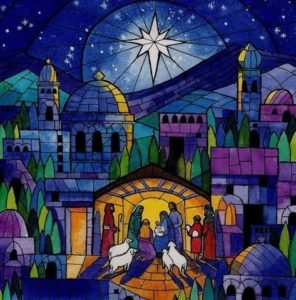 Fiction or non-fiction? Truth or lie? Historical fact or just a myth?Here we are at Christmas time where much of the community, church folk and non-church folk alike, will celebrate the birth of Jesus. And more importantly, we celebrate "the incarnation of God," which is just a fancy way of saying "God became flesh."In recent years I have heard numerous discussions around the historical accuracy of the Bible including the Christmas story. The discussions often revolve around the events which we might consider supernatural."Was Mary really a virgin when she conceived Jesus?" "Did an angel really appear to the shepherds to tell them of Jesus' birth?" "Was Jesus really both a person and God, both human and divine?"Historical fact or just a myth? To the modern mind this question seems pressing. To a society which measures truth by scientific instruments this question begs for a straight answer. We want to know, "Is it fiction or non-fiction, truth or lie, historical fact or just a myth?"Those who can't swallow that the events surrounding Jesus' birth are historically accurate sometimes say, "Oh, the whole Christmas story is just a myth." This is a statement to which I must agree. However, I would say, "It is not JUST a myth. Rather, it is NO LESS than a myth."
Fiction or non-fiction? Truth or lie? Historical fact or just a myth?Here we are at Christmas time where much of the community, church folk and non-church folk alike, will celebrate the birth of Jesus. And more importantly, we celebrate "the incarnation of God," which is just a fancy way of saying "God became flesh."In recent years I have heard numerous discussions around the historical accuracy of the Bible including the Christmas story. The discussions often revolve around the events which we might consider supernatural."Was Mary really a virgin when she conceived Jesus?" "Did an angel really appear to the shepherds to tell them of Jesus' birth?" "Was Jesus really both a person and God, both human and divine?"Historical fact or just a myth? To the modern mind this question seems pressing. To a society which measures truth by scientific instruments this question begs for a straight answer. We want to know, "Is it fiction or non-fiction, truth or lie, historical fact or just a myth?"Those who can't swallow that the events surrounding Jesus' birth are historically accurate sometimes say, "Oh, the whole Christmas story is just a myth." This is a statement to which I must agree. However, I would say, "It is not JUST a myth. Rather, it is NO LESS than a myth." Myths are one of those powerful and profound realities that help shape and give meaning to the experiences of life. Much of the Bible is myth. Which means that it may not be true in an historical or scientific sense. But its truth lies in deeper places, more sacred than instruments can touch.Joseph Campbell, considered the world's leading mythologist, says this: "Mythology is not a lie, mythology is poetry, it is metaphorical. It has been well said that mythology is the penultimate truth--penultimate because the ultimate cannot be put into words. It is beyond words, beyond images...Mythology pitches the mind...to what can be known but not told. So this is the penultimate truth." (The Power of Myth, 1988)In other words, myths point us to the ultimate truth--a truth which lies beyond any story or historical event. We don't believe the Christmas story is true because someone found evidence that Mary really was a virgin, or because it was proven that God really did descend and become human in Jesus. We believe the Christmas story is true because it points to the ultimate truth--a truth we feel and know, but can only express through mythic stories.
Myths are one of those powerful and profound realities that help shape and give meaning to the experiences of life. Much of the Bible is myth. Which means that it may not be true in an historical or scientific sense. But its truth lies in deeper places, more sacred than instruments can touch.Joseph Campbell, considered the world's leading mythologist, says this: "Mythology is not a lie, mythology is poetry, it is metaphorical. It has been well said that mythology is the penultimate truth--penultimate because the ultimate cannot be put into words. It is beyond words, beyond images...Mythology pitches the mind...to what can be known but not told. So this is the penultimate truth." (The Power of Myth, 1988)In other words, myths point us to the ultimate truth--a truth which lies beyond any story or historical event. We don't believe the Christmas story is true because someone found evidence that Mary really was a virgin, or because it was proven that God really did descend and become human in Jesus. We believe the Christmas story is true because it points to the ultimate truth--a truth we feel and know, but can only express through mythic stories.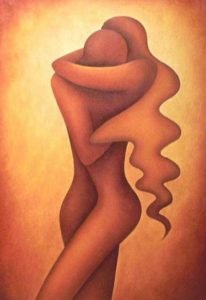 We believe the Christmas myth because it unveils the beautiful dance between the human and her partner, the divine, in each of our lives. We believe the Christmas myth because it reveals the spiritual nature of all births and new beginnings. We believe the Christmas myth because it teaches us about the nature of our lives. It teaches us that God and flesh are not separate and, in fact, are tightly intertwined in such a way that we are "fully human, fully divine."It doesn't matter whether the events surrounding Jesus' birth happened exactly as they are portrayed. All that matters is whether you feel more alive and compassionate when you read it. All that matters is whether it puts you in touch with the human/divine dance playing within you. If it does that then this myth holds more truth than any historical event will ever hold.The Christmas story is not JUST a myth. It is NO LESS than a myth.
We believe the Christmas myth because it unveils the beautiful dance between the human and her partner, the divine, in each of our lives. We believe the Christmas myth because it reveals the spiritual nature of all births and new beginnings. We believe the Christmas myth because it teaches us about the nature of our lives. It teaches us that God and flesh are not separate and, in fact, are tightly intertwined in such a way that we are "fully human, fully divine."It doesn't matter whether the events surrounding Jesus' birth happened exactly as they are portrayed. All that matters is whether you feel more alive and compassionate when you read it. All that matters is whether it puts you in touch with the human/divine dance playing within you. If it does that then this myth holds more truth than any historical event will ever hold.The Christmas story is not JUST a myth. It is NO LESS than a myth.
I Was Once a Stranger...
Mystic Mondays December 12, 2016Dear Readers,The following post is an edited version of a blog post that I written while on my Rome to Rumi pilgrimage in the fall of 2014 just as the political environment was becoming fragile and dangerous in Turkey. Because of recent events regarding the treatment of American Muslims and an intention to dive into my From Rome to Rumi book I have decided to reprint this edited version.Here it is:I woke up in Kesan for my first full day in Turkey after cycling 1,500 miles through Italy and Greece. While eating breakfast the news on the screen above me didn’t look good. German shepherds, tear gas, armored tanks and vandalized storefronts and vehicles filled the screen. I had pedaled my way right into a political crisis. ISIS was attacking the Kurds just over the southern border. The Turkish government was slow to respond and the Turkish people were letting their displeasure be known.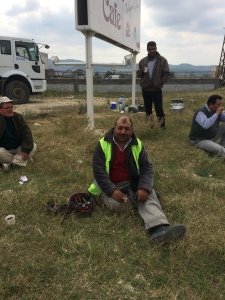 I was in a foreign land. Didn’t speak a word of Turkish and had no idea of how Turkish Muslims would react to an American clad in funny spandex clothing riding through their country at the height of political unrest. I was soon to find out. I hadn’t traveled more than fifteen kilometers when a man with a bald head started gesturing my way with a large loaf of bread. He was inviting me to join him and his road crew for lunch.I wasn’t hungry, but I wasn’t going to pass up this opportunity nor take the risk of offending my new Turkish hosts. I was given a large tray filled with lentil soup, rice, some sort of meatballs and a half loaf of bread. I picked away at the items eating the most easily digestible items first. I didn’t want to stuff myself and find myself vomiting down the road later.Next came an awkward dance. I couldn’t finish my meal, but it was also clear that I hadn’t eaten enough to satisfy some unspoken rule that I could feel in the air. The man to the left of me clearly expected me to eat everything that was put in front of me. The man to the right, who had first waved me over, was trying to guide me through the meal. Finally the message became clear—I could leave everything on my tray except for the meatballs. Those could not be wasted.As soon as I finished the last meatball the man to the right snatched up my tray and shoveled the rest of the food off into the grass. Then he pointed to a herd of goats nearby and gestured between them and his mouth. They had killed a goat for this meal. Cultural and religious protocol demanded that all of it be eaten. The sacrifice of an animal was to not be treated lightly.
I was in a foreign land. Didn’t speak a word of Turkish and had no idea of how Turkish Muslims would react to an American clad in funny spandex clothing riding through their country at the height of political unrest. I was soon to find out. I hadn’t traveled more than fifteen kilometers when a man with a bald head started gesturing my way with a large loaf of bread. He was inviting me to join him and his road crew for lunch.I wasn’t hungry, but I wasn’t going to pass up this opportunity nor take the risk of offending my new Turkish hosts. I was given a large tray filled with lentil soup, rice, some sort of meatballs and a half loaf of bread. I picked away at the items eating the most easily digestible items first. I didn’t want to stuff myself and find myself vomiting down the road later.Next came an awkward dance. I couldn’t finish my meal, but it was also clear that I hadn’t eaten enough to satisfy some unspoken rule that I could feel in the air. The man to the left of me clearly expected me to eat everything that was put in front of me. The man to the right, who had first waved me over, was trying to guide me through the meal. Finally the message became clear—I could leave everything on my tray except for the meatballs. Those could not be wasted.As soon as I finished the last meatball the man to the right snatched up my tray and shoveled the rest of the food off into the grass. Then he pointed to a herd of goats nearby and gestured between them and his mouth. They had killed a goat for this meal. Cultural and religious protocol demanded that all of it be eaten. The sacrifice of an animal was to not be treated lightly.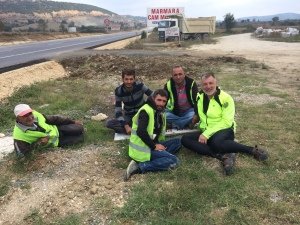 Only later did I discover that what I had been invited into was a celebration of Eid al Adha, “The Festival of Sacrifice” one of two high holy days on the Muslim calendar. One aspect of the celebration is that one-third of the sacrificed goat must go to the stranger, the pilgrim, and the needy. I just happened to come by at the right moment and I was the stranger who took my place in the unfolding drama of this holy celebration. When we parted we shared a deep embrace and the double kiss that is custom in the East. I was a welcome guest in this foreign country.I share this today because in recent weeks we have heard that mosques are being threatened with violence and American Muslims are being targeted for harassment and even hate crimes. It is hard to imagine the Muslim brothers I met that day deserving such treatment and vitriol. They were just the opposite of the stereotypes we have concocted.What I experienced that first day in riding into Turkey became the pattern for the next three weeks as I cycled into the heart of Turkey. I was repeatedly invited to share tea with shop owners and random people I had met. I was welcomed into mosques to pray without any hesitation or wariness on their part.“Welcoming the stranger” is a way of life for the vast majority of Muslims. It’s a cultural expectation and a religious responsibility. I will forever remember my three weeks of being welcomed by Muslim brothers and sisters in Turkey in the middle of a political crisis.Now it’s our turn. Let’s return the favor.
Only later did I discover that what I had been invited into was a celebration of Eid al Adha, “The Festival of Sacrifice” one of two high holy days on the Muslim calendar. One aspect of the celebration is that one-third of the sacrificed goat must go to the stranger, the pilgrim, and the needy. I just happened to come by at the right moment and I was the stranger who took my place in the unfolding drama of this holy celebration. When we parted we shared a deep embrace and the double kiss that is custom in the East. I was a welcome guest in this foreign country.I share this today because in recent weeks we have heard that mosques are being threatened with violence and American Muslims are being targeted for harassment and even hate crimes. It is hard to imagine the Muslim brothers I met that day deserving such treatment and vitriol. They were just the opposite of the stereotypes we have concocted.What I experienced that first day in riding into Turkey became the pattern for the next three weeks as I cycled into the heart of Turkey. I was repeatedly invited to share tea with shop owners and random people I had met. I was welcomed into mosques to pray without any hesitation or wariness on their part.“Welcoming the stranger” is a way of life for the vast majority of Muslims. It’s a cultural expectation and a religious responsibility. I will forever remember my three weeks of being welcomed by Muslim brothers and sisters in Turkey in the middle of a political crisis.Now it’s our turn. Let’s return the favor.
Thanks Diana Butler Bass
Mystic Mondays December 5, 2016
"I feel like I am trying to find my voice again."
 Those were the words (or something close) of Diana Butler Bass last week on a Facebook post. Butler Bass is the author of at least ten books on culture and religion and a person who is considered to have a finger on the pulse of the American religious landscape. I had been feeling those same words in recent months and especially acutely since waking up on November 9. I had wondered what was going on with me. I breathed a sigh of relief when the great Diana Butler Bass was also feeling a bit lost.This has really rattled me. I have spent recent years following a call to find a new way to be a religious voice in the community. It is my chosen profession and my deepest passion. I have two religious degrees and two decades of experience serving as a pastor of Protestant churches. Yet in recent years the pulpit has slowly transformed from the moral centerpiece of the community to the exclusive property of church members.In many ways my pilgrimages and blogging have been my way of building a new pulpit that speaks not only to the faithful within church walls, but to a whole community seeking spiritual reflection and growth. I thought I knew what I was doing. I was exploring the modern return of ancient religious mysticism. I was speaking the language of the "spiritual but not religious." I was carving out a new voice for myself in this changing religious and cultural landscape.And then November 9 happened. Trump crashed a party I didn't even know we were having. A political and spiritual earthquake shook us to the core.And now I feel lost. What the hell does mysticism have to do with our new reality? Do terms like "spiritual but not religious" have any meaning in this new world? Will it really matter? Is the only thing that matters now whether one is for Trump or against?
Those were the words (or something close) of Diana Butler Bass last week on a Facebook post. Butler Bass is the author of at least ten books on culture and religion and a person who is considered to have a finger on the pulse of the American religious landscape. I had been feeling those same words in recent months and especially acutely since waking up on November 9. I had wondered what was going on with me. I breathed a sigh of relief when the great Diana Butler Bass was also feeling a bit lost.This has really rattled me. I have spent recent years following a call to find a new way to be a religious voice in the community. It is my chosen profession and my deepest passion. I have two religious degrees and two decades of experience serving as a pastor of Protestant churches. Yet in recent years the pulpit has slowly transformed from the moral centerpiece of the community to the exclusive property of church members.In many ways my pilgrimages and blogging have been my way of building a new pulpit that speaks not only to the faithful within church walls, but to a whole community seeking spiritual reflection and growth. I thought I knew what I was doing. I was exploring the modern return of ancient religious mysticism. I was speaking the language of the "spiritual but not religious." I was carving out a new voice for myself in this changing religious and cultural landscape.And then November 9 happened. Trump crashed a party I didn't even know we were having. A political and spiritual earthquake shook us to the core.And now I feel lost. What the hell does mysticism have to do with our new reality? Do terms like "spiritual but not religious" have any meaning in this new world? Will it really matter? Is the only thing that matters now whether one is for Trump or against?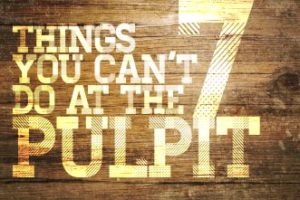 And what about that church pulpit that has felt more and more pushed to the sidelines of American politics and culture in recent decades? Will pulpits be defined by how closely they cozy up to Trump or how often they criticize Trump through veiled references? Will churches find themselves even further down the path of irrelevancy as they preach a soft neutrality and half-truths? Or will preachers once again claim that once sacred and honored tradition to be the moral voice for the community holding our leaders to a higher standard of ethical and spiritual character? Will we preach the gospel with no concern for who it offends or doesn't offend only seeking to please God Herself."I feel like I am trying to find my voice again," writes Diana Butler Bass. If she, who has had one of the clearest and most distinctive voices in our culture, is questioning her voice I wonder how much we all are questioning our voices, our choices and our priorities. She is rattled. I am rattled. I wonder if you all are rattled too. Here are the questions I am now asking:"Can I continue to write under a title 'Mystic Mondays' and feel that it has any relevance to our time?""What is my voice now? Is to renew that prophetic role from the pulpit that first drew me to preaching? Is it to take my blogging and speaking a whole new direction?""Are there things more important than work and financial security?""What are the risks of doing something? What are the risks of not doing something?""Shall I retreat from political responsibility into bike riding, guitar playing and family and friends and hope all this just passes?""Shall I buckle down for the long haul and commit to fighting a war that feels imminent?"
And what about that church pulpit that has felt more and more pushed to the sidelines of American politics and culture in recent decades? Will pulpits be defined by how closely they cozy up to Trump or how often they criticize Trump through veiled references? Will churches find themselves even further down the path of irrelevancy as they preach a soft neutrality and half-truths? Or will preachers once again claim that once sacred and honored tradition to be the moral voice for the community holding our leaders to a higher standard of ethical and spiritual character? Will we preach the gospel with no concern for who it offends or doesn't offend only seeking to please God Herself."I feel like I am trying to find my voice again," writes Diana Butler Bass. If she, who has had one of the clearest and most distinctive voices in our culture, is questioning her voice I wonder how much we all are questioning our voices, our choices and our priorities. She is rattled. I am rattled. I wonder if you all are rattled too. Here are the questions I am now asking:"Can I continue to write under a title 'Mystic Mondays' and feel that it has any relevance to our time?""What is my voice now? Is to renew that prophetic role from the pulpit that first drew me to preaching? Is it to take my blogging and speaking a whole new direction?""Are there things more important than work and financial security?""What are the risks of doing something? What are the risks of not doing something?""Shall I retreat from political responsibility into bike riding, guitar playing and family and friends and hope all this just passes?""Shall I buckle down for the long haul and commit to fighting a war that feels imminent?" A month ago the world changed. How much, I just don't know yet. What I do know is that the things that have helped me keep my bearings have either been shattered or shaken up. I don't know which way is up any longer. I vacillate back and forth between an engaged anger at one moment to a crumpled mass of nervous, useless flesh at other moments. What felt real a month ago has vanished like steam. A world that made sense a few weeks ago now seems more like a jostled Scrabble board.Here's what I promise you, however. I will keep writing. I will keep sharing my confusion. I will feel and experiment and write my way through this. If I am angry that's what you'll get. If I am in a fighting mood that's what you'll read about. If I happen to see some deeper mystical purpose in all of this I promise not to keep it to myself. I will tell if I am feeling despondent just as easily as if I am feeling tenacious. And hopefully, word by word, feeling by feeling, day by day, it will all make sense again.The truth is I never really lost my voice. This is my voice. It won't always be pretty. But you can be damn sure that it will be honest.Thanks, Diana, for being honest too.
A month ago the world changed. How much, I just don't know yet. What I do know is that the things that have helped me keep my bearings have either been shattered or shaken up. I don't know which way is up any longer. I vacillate back and forth between an engaged anger at one moment to a crumpled mass of nervous, useless flesh at other moments. What felt real a month ago has vanished like steam. A world that made sense a few weeks ago now seems more like a jostled Scrabble board.Here's what I promise you, however. I will keep writing. I will keep sharing my confusion. I will feel and experiment and write my way through this. If I am angry that's what you'll get. If I am in a fighting mood that's what you'll read about. If I happen to see some deeper mystical purpose in all of this I promise not to keep it to myself. I will tell if I am feeling despondent just as easily as if I am feeling tenacious. And hopefully, word by word, feeling by feeling, day by day, it will all make sense again.The truth is I never really lost my voice. This is my voice. It won't always be pretty. But you can be damn sure that it will be honest.Thanks, Diana, for being honest too.
